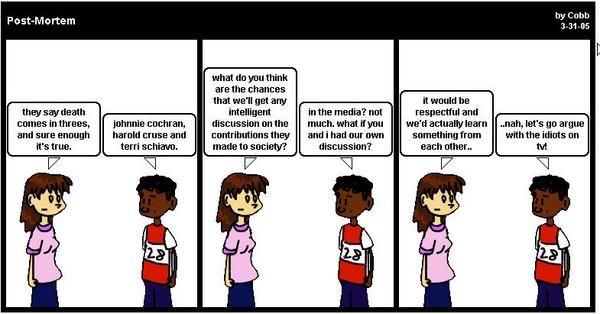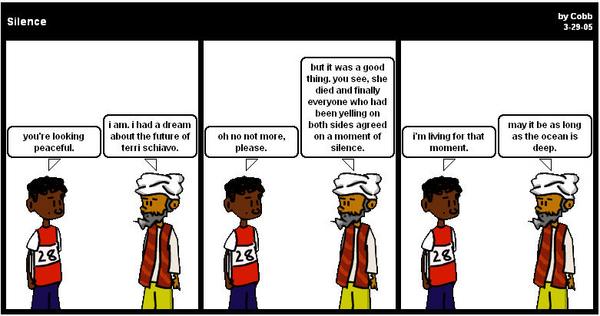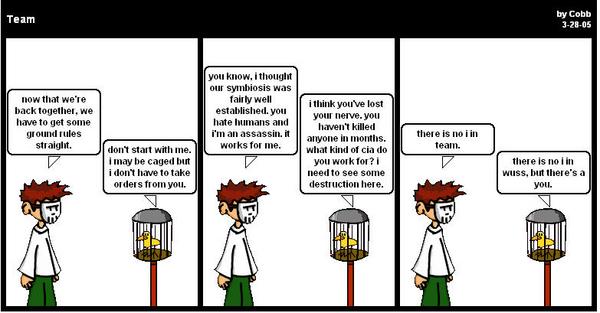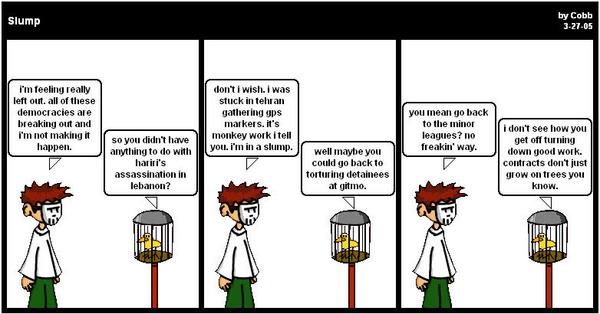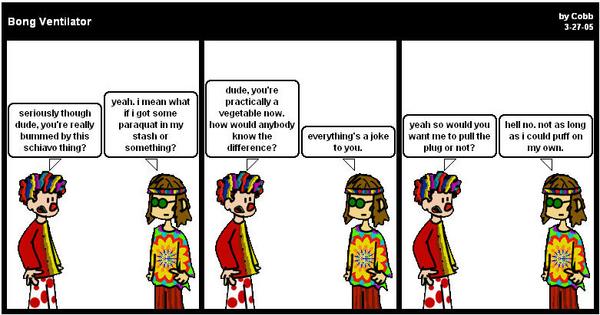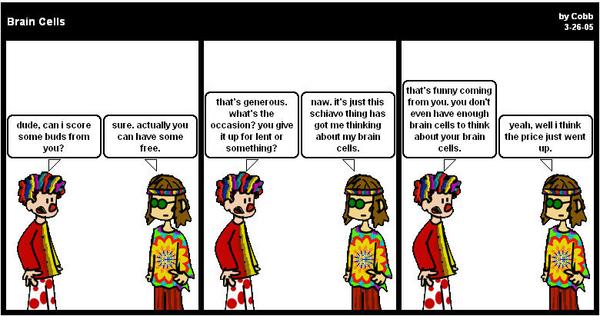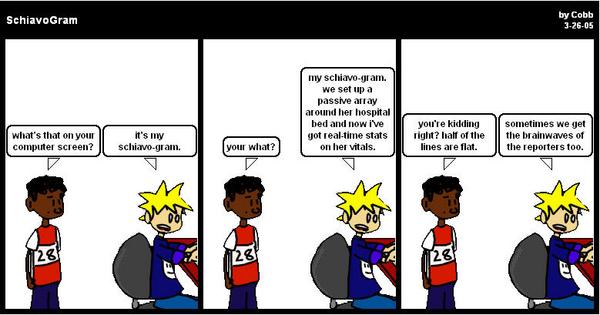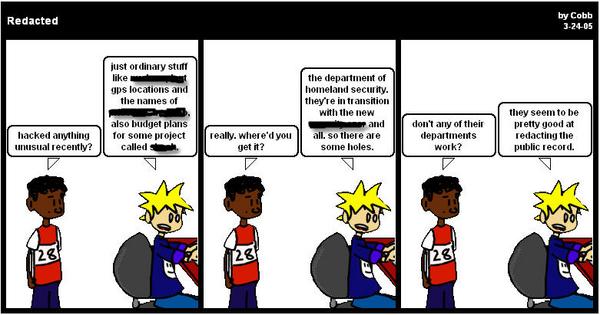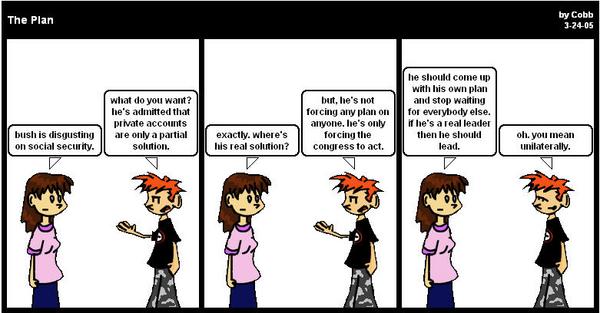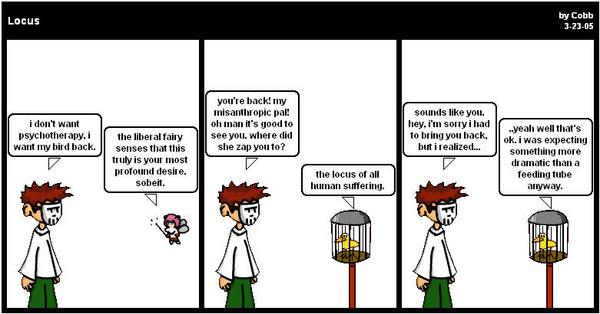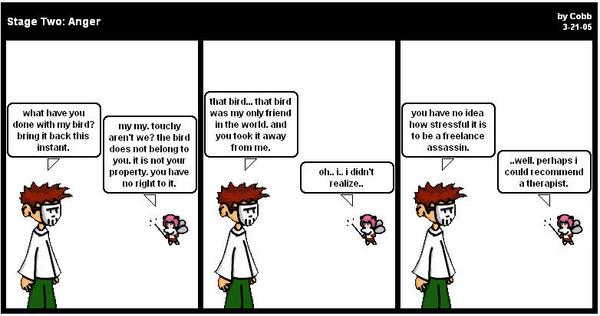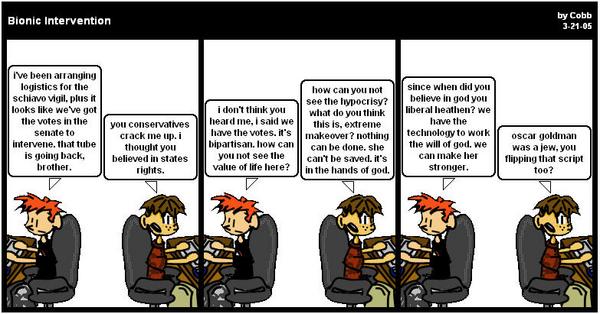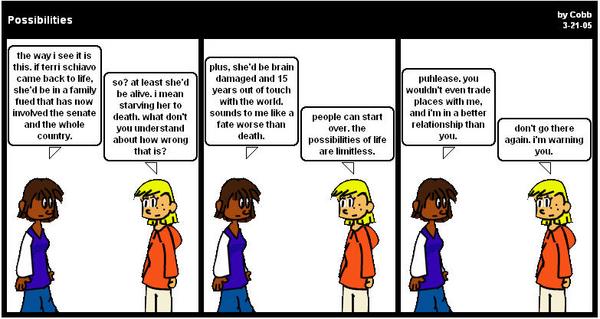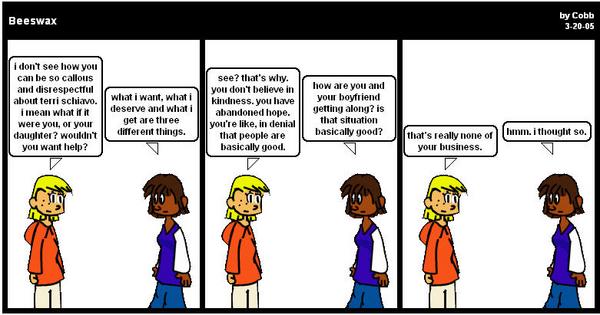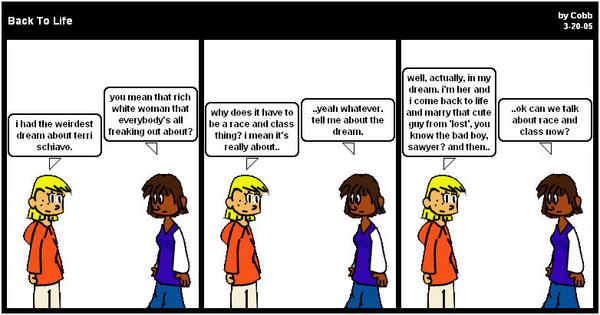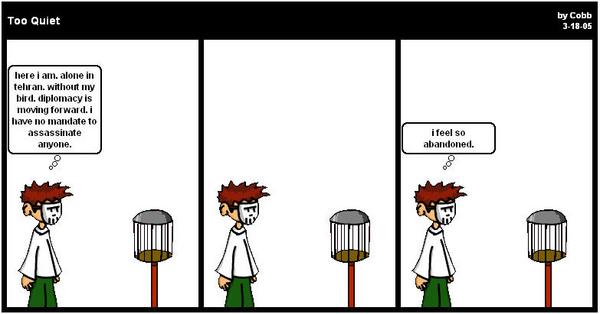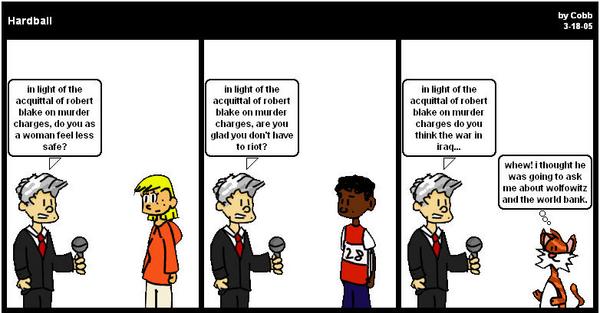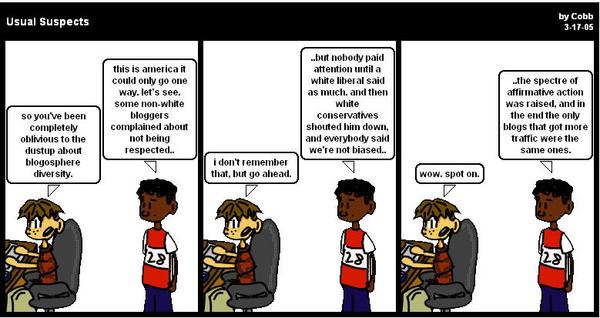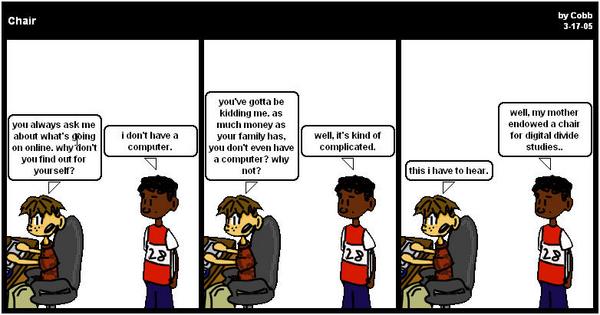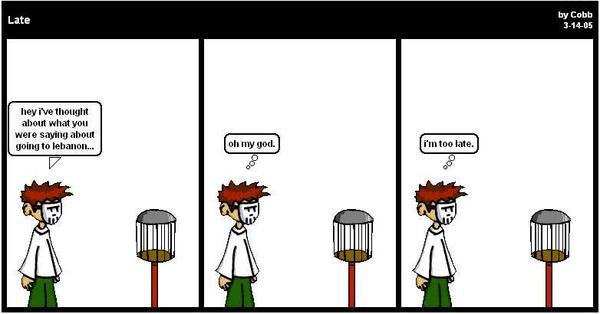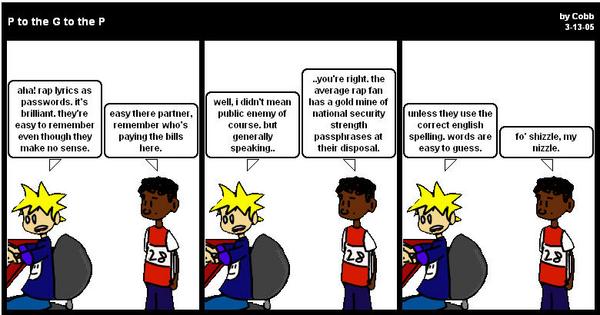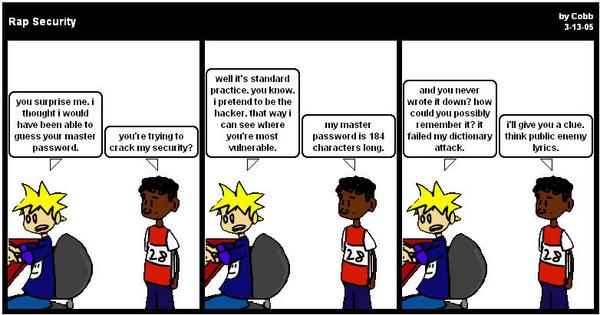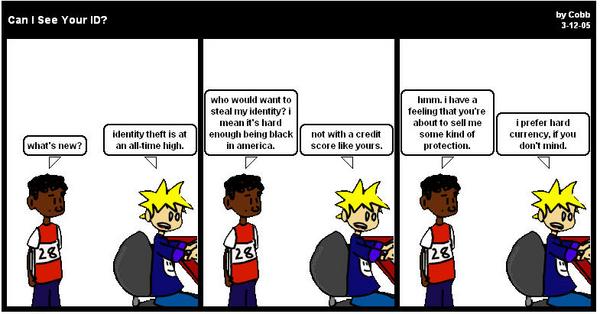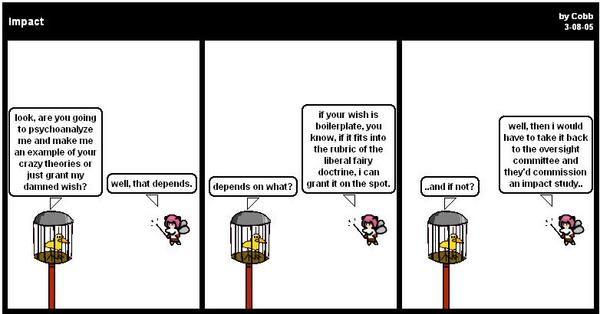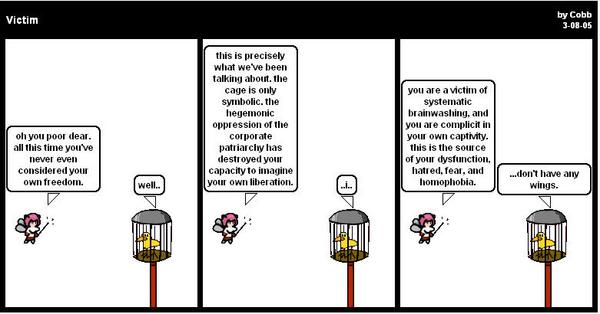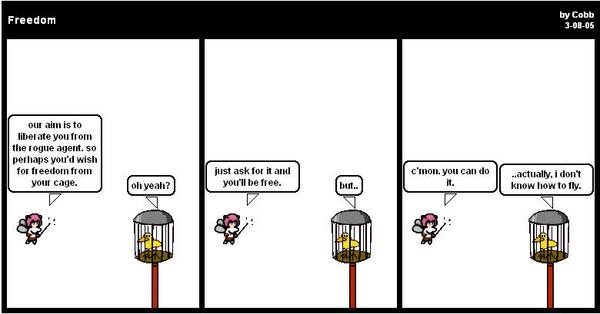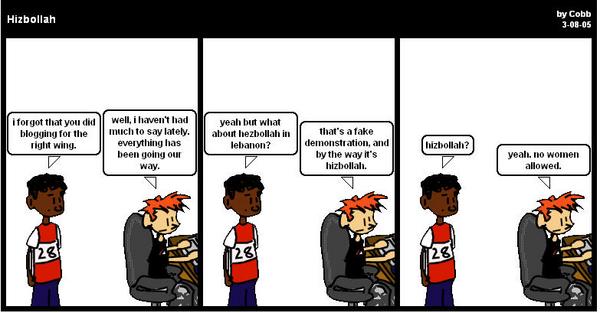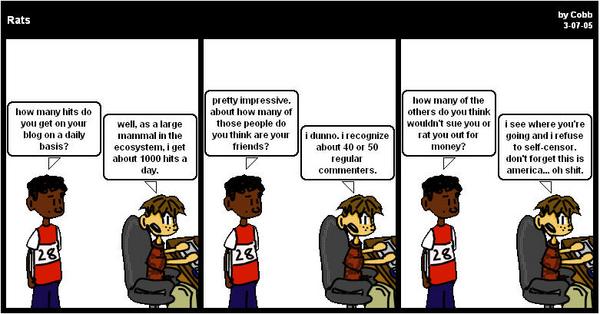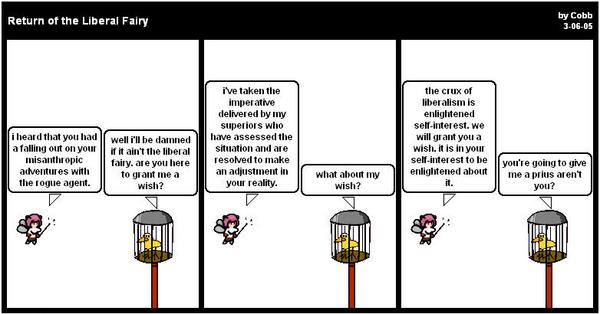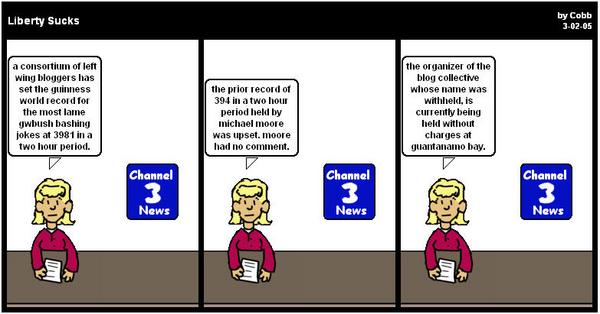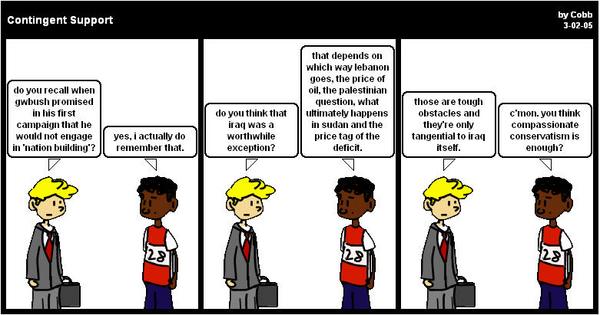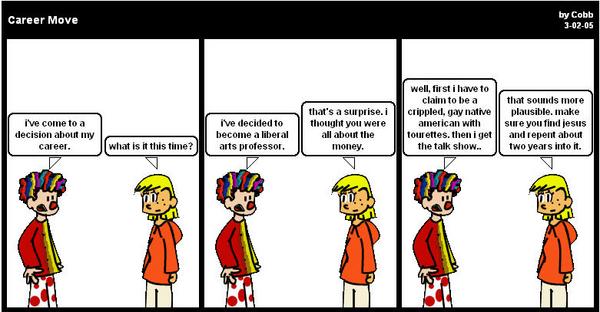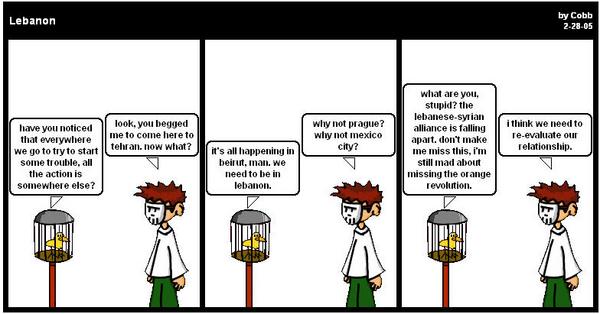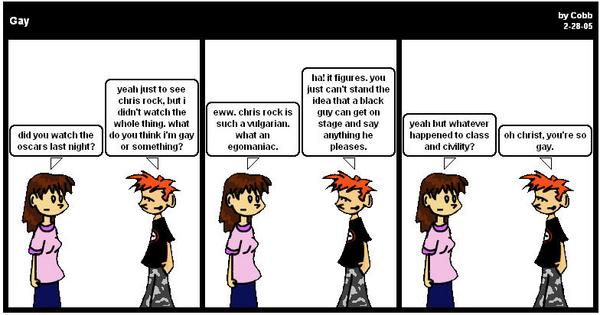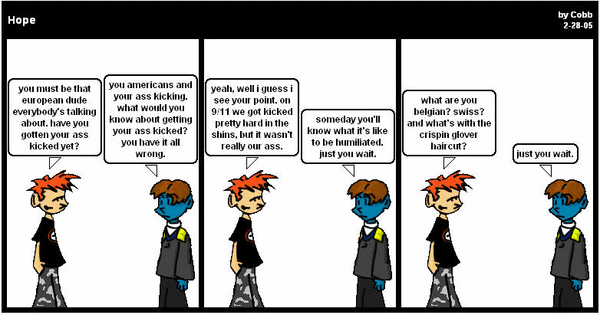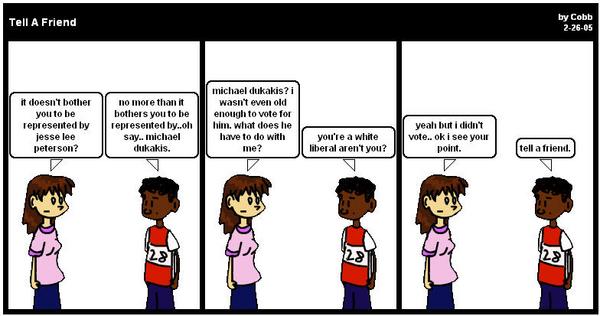March 31, 2005
Reggie Mebane
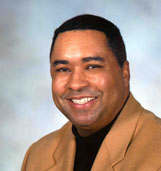
Reggie Mebane was recently hired to manage a big part of the CDC. He's a friend of the family, so we had to pub him up. Reggie is a testament to hard work, humility and integrity. Congrats!
CDC Leadership Profile:
Meet Reggie Mebane
As part of our series of leadership profiles, we continue with a profile of Reggie Mebane, MS, Chief Management Officer, Coordinating Center for Infectious Diseases.
Name:
Reginald R. Mebane
MS Title:
Chief Management Officer, Coordinating Center for Infectious Diseases (February 2005)
Responsibilities:
Direct authority for business operations (including human capital, information technology, grants, facilities, administrative services, etc.) for the Coordinating Center for Infectious Diseases (CoCID). He is one of seven Chief Management Officers (CMOs) who report directly to Bill Gimson, CDC's Chief Operating Officer.
First job at CDC:
Current position
Path to public health:
"My path to CDC started with my path at FedEx. I started working for FedEx in 1981 when I took a part-time position as a handler where I unloaded trucks, loaded planes, etc., while working toward my bachelor's and master's degrees from the University of Memphis.
"While I worked at night at FedEx, I worked as a psychiatric case manager and psychotherapist in Memphis, during the de-institutionalization of the mentally ill. That was my first tie to public service, and I did that for about six years. That work taught me very valuable life lessons in leadership and humanity-that stereotypes are not accurate and that perseverance is the most crucial life leadership skill of all. As a result of this experience, I later became Chairman of the Memphis Health, Education & Housing Finance Board. The restructuring of this board under my chairmanship is my legacy to Memphis in making housing affordable to people of moderate income means.
"Over the years, I was promoted at FedEx-to manager, then senior manager and eventually, as part of the FedEx Leadership Institute, teaching leadership and management practices to FedEx employees from all parts of the company around the world. I also was the corporate lead for diversity training from 1995 to 1997. In 1997, I was promoted to Director of International Operations, where I was responsible for overseeing shipments to and from more than 200 countries.
"In 2001, I moved to Buffalo, New York, to become the Chief Operating Officer for a company that FedEx acquired-one with $2 billion in revenue yearly. My job was to manage the massive changes, create best business practices and facilitate the merger and integration of over 1,000 new employees.
"About three years into this assignment, FedEx went through a major reorganization and restructuring. Just for perspective, the company has over five different operating companies and over 150,000 employees worldwide with over $27 billion in revenues. Each company operated independently, but competed collectively. I like to think that there are immense parallels to the change we're experiencing now at CDC.
"After this reorganization, FedEx offered senior executives the opportunity to take an early severance package or early retirement. It was the opportunity of a lifetime for me to have a whole new management career and the freedom to choose a career path based on my personal passion to serve others.
"It was CDC's mission that attracted me here. CDC is an icon name brand just like FedEx or Wal-Mart. You could not be doing more important work in life than what the great people of this organization are doing now-saving lives and improving health.
"One other career area that I'd like to mention is teaching. While I worked the night shift at FedEx, I also was on the adjunct faculty of the University of Memphis. Last year I also taught at the University of Buffalo in the MBA program."
Last book(s) read:
His Excellency: George Washington by Joseph J. Ellis. "I really love old detective stories that took place in the 1930s, 1940s and 1950s. My favorite author of all time is Ross MacDonald (that was his pen name; his real name is Kenneth Millar). I am also reading a series of biographies-Benjamin Franklin, John Adams, and Alexander Hamilton."
Family:
Married 18 years to his wife, LaRhonda, who has a background in finance. They have twin daughters, Lindsey and Mallory, age 17, who have aspirations to study law and medicine, respectively. They both have black belts in karate.
"In my free time, I enjoy exercising, writing and old movies-Turner Classic Movies, especially film-noir. I collect CDs and DVDs of old-time radio shows-like the Lone Ranger, The Mercury Theater, Orson Wells and gum-shoe detective stories.
"By the way-FedEx was featured in the movie "Castaway." I was actually in the movie. At the end of the movie when the Tom Hanks character is being welcomed back to FedEx at a banquet, they wanted real FedEx executives. The 10 seconds you see me on the screen took two days to shoot!"
What are the top priorities you are working on? "Over the next 30-60 days, the big challenge for me is to get a handle on organizational performance and build a good business plan that will enhance all three centers (NIP, NCHSTP, NCID)." Meanwhile, a top priority "is getting the Coordinating Center up and running from a staffing perspective. We would like to have the Coordinating Center fully staffed by September.
"The next immediate priority is improving communications with all the divisions and branches. That means we get our website updated, make sure there is information coming out consistently from myself and Mitch [Cohen, Director, CCID] so that people will know where we are in our efforts related to the Futures Initiative. More importantly, we must build in mechanisms for effective feedback and consistent leadership visibility and accessibility. This means face-to-face meetings in groups and in one-on-one sessions within and outside our own coordinating centers. In my most recent meetings with staff and people throughout the organizations, one point that keeps coming up is that it is important for us to clarify how the new organizational structure will add value. The second thing is to really be clear on goals and roles within the centers.
"I also plan to continue to fully share best practices with my fellow CMOs and to utilize the Management Council and Executive Leadership board as platforms for strategy and positive change related to the Futures Initiative."
Mebane also plans to focus on leadership. Citing The Leadership Challenge by James M. Kouzes and Barry Z. Posner, he said "Good leaders inspire the heart-I think this is the soft side of the leadership challenge we need to work on. It doesn't matter if you are a technology person or a scientist, behind it all we are still people, and people still want to feel connected to the organization and connected to the leadership. That's why we have to make a concerted effort to be more visible and accessible. The other thing we have to do is enable people to act-we should create a culture where people act responsibly and freely. We should also reward and provide incentives for people who embody those values.
"On the service side of the business, we have to look at how we can run the business better. As a team, we must collaborate to figure out how best to consolidate services, create efficiencies and run the business better while simultaneously doing the right thing by our people. Establishing best business practices and creating efficiencies are at the top of the list on the service side.
"As for my top finance priorities, I am focused on executing the current budget and planning for the next year. I think that we can both meet our public health mission and save money in some areas. In order to be able to do that, we need to engage people in the process to look hard and deep at what we are doing and finding more creative ways to do business better.
"To summarize, my focus right now at CDC is on being the best leader and doing the best job that I can. I want employees to know my sincere commitment to the organization and to the people. They won't find anyone who will work harder or longer or be more sincere in trying to do the right thing for the organization and its people. It's the way I've always managed and to me, it's not just a job, it's a way of life.
"Longer term, I hope to be a part of this organization for many years. I'm very proud to be a part of the CDC mission. My motto is no egos, no silos; one team, one mission."
Harold Cruse: The Last Organic
Harold Cruse was one of those rare scholars who wrote so much about things nobody ever talks about that you have to stop every 20 pages or so just to absorb it. It has been quite a while since I read 'The Crisis of the Negro Intellectual' and 'Plural But Equal' so it's difficult for me to disaggregate his lessons from my thinking. Very little of it seems to have distinguished itself in my memory as distinctly belonging to Cruse. But there are some distinct ideas.
Cruse was one of those who asserted that the Brown case was improperly decided. Seperate and unequal was certainly a problem, but the problem was not with separate, but with unequal. Cruse argues that the law should have been used to force the equal funding of public schools in black communities, instead what arose in the ethos of integration was a double strike against blacks. Firstly, the very assertion by Brown that black and white kids be integrated degraded the quality of all public schools by generating white flight. Anywhere there were significant numbers of blacks, many whites left the public school system and created new private schools. It has been noted that many private schools around the South were founded in 1954. This not only hurt blacks but damaged the public support for public schools.
Secondly and somewhat more on point with how many black nationalists feel, the thrust of integration undermined black independence. The famous proximity premise, has by all measures pretty much been discredited. Black students don't become better people simply by sitting in the same schools as white students. The 'goodness' of whites doesn't 'rub off'. There are plenty ways to argue around the matter of the proximity premise, but I essentially don't buy it either. Some of the weakest ideas which have become ossified into the conventional thinking are the root of the fallacies surrounding the Diversity industry.
As many of you might guess, I could bust a gut talking about black political dependence on white liberal spew a la Howard Dean. There is a low intensity war between Integrationists and Aggregationists. (Separatists don't stand a chance.) Perhaps Cruse's passing will re-ignite a debate on the merits. As an Old Schooler, I might seem conflicted, but if you understand that I am an elitist than you'll see how I'm for Aggregation for me and those like me, and Integration for the rest of you who can't afford to do any better. I still say bomb the ghetto.
Many folks are acknowledging Cruse's way of seeing integration. The NAACP famously started questioning the wisdom of Brown along Cruse's line of thinking. What's odd about that is that they seem ill-prepared to do anything about it but give blackfolks a reason to complain. The NAACP is not organized to assist in aggregation, but perhaps they only see their job as 'raising the issue', which is fair. I'm not so sure anyone expects anything more.
The question of aggregation is open, and I've seen some efforts going on here in Los Angeles, with regard to the charter school movement. These are mostly done in partnership with other non-whites with conservative lip service support. Charter schools are all experiments as far as I can see and I'm all for school reform (primarily skills-based promotion starting at middle school).
Cruse also speaks of the Blair Bill which, had it been implemented when the idea first arose, the progress of African America would have had a 100 year headstart.
I agree with Cruse with respect to colorblindness. In fact I have spent many years arguing in public debates that colorblindness is the moral equivalent of racism in this country. It was most likely Cruse that got me started on this angle.
It's difficult for me to tell how and where Cruse might be influential, because quite frankly, black public intellectuals are not so ready to engage the public outside of the academy, or specifically here on the web. This is an old complaint of mine and I've worn a groove in my mind repeating it, even though it's not as true as I'd like it to be. But I think I've internalized enough of his ideas about pluralism and equality to be an adequate representative outside of the professoriate. I trust my man Spence's judgement that I have been properly informed. If I had the time, I'd certainly reread him, and I'll probably do some skimming this weekend. I'm also going to take the opportunity to see where his name pops up in the 'sphere. Watch this spot for updates.
I think that the most important thing to understand about Cruse is that he regrets the amount of dependence blacks have assumed on the general fairness of society based upon the political alliances between the Negro leadership and white liberal race politics. It has resulted in laws and ideas that have suppressed the vigor of black independence. I agree with him there. Clearly I am interpreting him through an appreciative and conservative lens but I think when we get to the heart of arguments like matters of pluralism vs assimilation or what is meant when people talk about 'equality', Cruse's thought on the matter will be salient.
Cruse is exceptional because he writes books that don't read like academic treatises, but deliver scholarship nonetheless. He's a comfort-busting individual thinker worthy of emulation and much respect. Ahh, I guess I can't just put him into the past tense so easily can I. None of us should.
March 30, 2005
Special Effect
(from the archives, my poem about OJ)
special effect
oj was a brotherman
whose time had come and gone
he didn't take the witness stand
so doubts will linger on
but doubts it seems are all we have
so when the jury spoke
the vision of our certainty
in justice quickly broke
but what had been a spectacle
from day one so it seems
could scarcely prepare anyone
not d.a. nor defense teams
for the screams and yelps and cutting eyes
and open mouths and speculation
who could ever prophesy
the racial polarization
that swept across our nation
do you recall the moment
some would ask? i was at work
my pager buzzed from reuters
and i read it with a smirk
'all over but the shouting'
was my grateful comment at the time
but when i saw the tv shows
i knew there was another crime
it seems someone decided or colluded
and collided with the common sense
of reticence and in the verdict's wake
despite the few peanuts at stake...
the cameras in the 'hood went click click click
the mikes in the 'hood went stick stick stick
of violence and of mayhem all will claim a great abhorrence
but everyone had camera crews at normandie and florence
the readiness for riots was the order of the day
surprise, surprise, surprise and so it spun another way.
i witnessed jubilation, exaltation by the black
and white humiliation, sobbing, patting on the back.
which ever way the verdict went the media was clear
one race would be filmed angry
and the other in great cheer.
alarms went off inside my head
they'll say ron and nicole are dead
and all those people do is laugh and dance
when white supremacy informs
the public consciousness then storms
of fear and hate will always be the stance
way back, with koon exonerated
i felt the sting and contemplated
the standing of a black man's words of truth
when knowing that a video
could sway the public to or fro
despite whatever blacks offered as proof
and so instead of goldman
or of oj or nicole
the nation focussed harshly
on a colored jury's soul.
a verdict rendered thusly must be racial so they say
for surely they just couldn't comprehend the dna
of johnnie and the jury in the matters of the case
there's but one theory to explain: conspiracy of race.
and if you don't believe that's true, then just watch your tv.
for all the negroes in the world are rowdies full of glee
or at least most, especially the ones that don't agree
that simpson is a killer and should never be set free.
that much joy is overstated
as the mainstream press related
happiness of the black sort
means that their view of the court
is nothing but a racial forum
without mention of the quorum
who have said most everywhere
that oj's blackness wasn't there.
until of course time magazine
played up the dark obsession
and made his cover photo darker
without much discretion
and some forget ms. harris
the ex-juror on the case
who claimed that sheriffs deputies
antagonized her race
and people claim she faked it
that race was *never* a factor
until judge ito backed her up
they called her just an actor.
but in the courtroom race itself
as a flashpoint ito denied
outside the courtroom pollsters pushed
a classic racialist divide.
they said those that believe in simpson
patently are black
and whites of course think otherwise
(and yes, we've got their back)
few pundits dared to bridge the rift
no pollster cared to split the diff
by education, party line
geography, zodiac sign
religion, history of crime,
orientation or other kind
of simple demographic
not age nor sex but racial traffic
(if i must name one, dominick dunne)
despite the fact that people vent
that oj can't be innocent
yet isn't that what we presume
until those in the jury room
have said without a doubt in fact
the man is guilty of the act?
but no, we watch the tv sets
in bedrooms, streets and foyers
we jump to place a guilty bet
and bitch about the lawyers
sworn to uphold defendants rights
in these united states
no wonder we have waco
ruby ridge and darryl gates
sad but true that two are dead
but when all is done and said
these two dead should signify
more than simply eye for eye
and tooth for tooth in a race war
(fuhrman's grinning even more
since we've chosen his world view)
and looking back i think it's true
there's nothing much to learn at all from tv murder trials
but prosecutors faces and defense attorney styles
and what a witness looks like when he's lying through his teeth
proving perjury needed no tapes so where's the beef?
the evidence admissible to television crews
spin doctored, sliced and diced and skewered daily on the news
for weeks on end, ubiquitous no matter where you tune
is bound to be quite dubious and yet since back last june
the country has sat spellbound in a simpson trial jones
a broken family's father spills his grief into our homes
a dozen pseudo witnesses sold their tales to feed the flame
a million hours of advertising bankrolling the game
but worst of all americans, despite that we've been warned
have swallowed so much swill as truth and think that we're informed.
and thinking all this edutainment legal evidence
believing the renditions of this tv farce made sense
accepting that all reason is on our side of the fence
have made ourselves the greatest fools, with racial consequence.
within just days the nation has decided from tv
not only what i'm thinking but a proper caste for me
as a black man with doubts about d.a. garcetti's case
(of course without the courage yet to say it to my face)
and though my fate is trivial, it's not for me i cry
i wonder for a moment if it's even worth a try
to believe that in our future there remains democracy
if everybody's thinking process hinges on tv
for clearly what is thought of blacks without our own consent
is taken from a broadcast of some ghetto tenement
where some for their own reasons known inside, their mouths agape
show happiness for a brief time, their smiles are caught on tape.
a smile taken callously and shown as disrespect
for bloody broken bodies...
Johnnie Cochran: Ordinary Hero
It's going to take a long time to get out all I want to say about Johnnie Cochran, especially now that Harold Cruse is gone. I met Johnnie on several occassions and I was good friends with one of the attorneys at his firm in Los Angeles, the firm that was there before he got supersized.
Cochran was your basic hero, the kind of crusader who never went off the deep end, a man who understood what was possible and never stopped being a champion or a defender. I think Ira Reiner had some fairly uncouth things to say last night on Warren Olney's show, then again Ira Reiner is not famous as Johnnie Cochran, and it shows.
I knew Johnnie from the perspective of black cultural nationalism, which is nothing more or less than that set of values that make blackfolks work together within America for their common benefit. Johnnie represented black law because Johnnie not only did the work, the integrative mainstream work, but he did the meta-work, opening doors, showing pathways and mentoring. He wasn't just a symbol, he was an active part of the process of getting kids into the profession. As such, there was a certain amount of BS that flew by the wayside. You couldn't complain about blacks not being properly represented in the legal profession or that nobody was doing anything about police brutality, because not only was Johnnie doing that, he had a chain of folks he could point to. He was to black law students what John Slaughter has been to black engineering students - the man that made so much happen.
Johnnie had a unique way about him. He was larger than life in quiet ways. He was both unassuming and unflappable. He made you think that, here was a man who had everything going for him, and yet he remained personable. He wasn't just 'the man' he was a node in a network, and when you knew that you could network with Johnnie Cochran, that was powerful inspiration indeed. At least that's how he appeared to me.
I first met him at a graduation affair. My friend 'Dianne' had just graduated from Law School and at the humble home of one of the others in her graduating class, people had gathered to munch, mingle and celebrate. There was an odd mix of the connected, family members, experienced attorneys, politicos and neighborhood folks and friends at the small gathering. Some of them whispered to me how much Johnnie had made connections with just about every organization of black law students. In the living room, the atmosphere was relaxed, while some serious political rap session was going down in the kitchen. There was a brief ceremony and Johnnie, along with the graduates decked in Kinte scarves, joined hands in a circle of prayer. Johnnie seemed, nothing more or less than everybody's kind and wise uncle.
What impressed me most about Cochran, was not the man himself but what he was trying to prove in the Reginald Denny case. If you haven't heard yet, he took on the LAPD in a new and unique way by defending the civil rights of a white man, at least that's the soundbite version. His case was essentially that Denny and several others suffered because police had made a strategic decision not to defend the lives and properties of people in black and latino neighborhoods. Since I am a big follower of Loury, Massey & Denton this was a new angle that made perfect sense to me. I don't know whatever became of the Denny case, but the implications of what might have been (and still may yet be) are fascinating.
Like most people, I know that Johnnie Cochran was police brutality's enemy number one. And I know that he was involved in most of the city's most notorious cases. What I didn't know was that 'If it doesn't fit, you must acquit' was not his idea. I'll try to find out more if I go to the funeral.
The last time I saw Johnnie was just a day before the OJ verdict. I saw him at the San Francisco airport. He stopped to say hello and I wished him good luck. He actually looked like he needed it.
Also: This time NPR got it right. I expect to hear a lot of idiocy about Cochran, but I'm not going to dignify it. I'll tell you that right now.
March 29, 2005
To Kill a Mocking Process
I have just been introduced to something that is giving me a reason, albeit late and a small reason, to respect Win32 just a tiny bit more. It is the Resource Kit.
Now I'm sure there are plenty of you out there who say, boy is this guy on the late freight. On the other hand, UNIX had kill -9, the lung-ripper, generations ago. That's what I needed and found in the Resource Kit. Virgil, if you're out there, you score one more point.
So I am finding a few more POSIX style utilities for Win32 and that's a pretty good thing. But I just wish I could get my old school ksh stuff to work without Cygwin. One of these days, I suppose.
NPR's Tech Idiocy
If you are within smelling range of an NPR affiliate, hold your nose. They are blowing a lot of gassy wind today.
Stinker #1.
Their coverage of the Grokster case is mischaracterizing it as idiot collegian music thieves vs rationality & the music industry's protection of artists. The critical thing that's going on here is potential destruction of the Betamax Shield. Basically, this is a product liability case. Can software firms be held liable for the abuse of the tools they create? The burden seems to be put on the software manufacturers to prove that their product cannot be abused, and by abused they mean subverting what is, in effect, a distribution oligarchy.
The way to keep your head through all of this is to remember that software are tools. Professionals like me need these tools to be able to do anything at all and manufacturers of these tools need to have the confidence that they can build uncompromised industrial strength tools. If they can't, that industry will go overseas.
As I mentioned earlier Mark Cuban makes a strong case as a content provider for Grokster's case. He gets it. Such a person is almost inconceivable in the way NPR and others have framed it. Here is someone who makes movies and he wants P2P technology to flourish. When you understand the real issues it makes you want to smack NPR. I guess today is just a smacky day.
Brain Fart #2
In the EU's settlement with MSFT, the Windows Media Player has been removed from the OS. NPR trots out a complete idiot who says that the more stuff you stuff into the operating system the better. The real scoop is that the more stuff you stuff into the operating system, the more unstable & unsecure it becomes. If NPR even breathes the word 'Linux' it should have enough sense to know this.
Tivo Pulls a Fast One
Well, it's finally happened. Tivo has gotten on my nerves, and suddenly that new Sean Penn movie that I was thinking about going to see is not so attractive any longer. You see, they've put in an advertisment when I was trying to avoid advertisements.
I watching '24' last night, a fairly good episode in which the bitching between Edgar and Chloe was top notch, and during the first commercial break I started my usual fast forward. (I started watching the show about 45 minutes behind schedule). An ad for 'The Translator' comes up and I see a green thumb, but I just scroll through it. Next thing I know, my Tivo has a popup ad!
So in the foreground of my screen is a video still for this movie and the ads are still fast forwarding in the background. No they didn't! And if that's not bad enough, the damned thing is still there for the next commercial break. I hate it, I absolutely hate it, and Tivo is going to hear from me. I don't mind the suggestions, I don't mind the special messages, I don't mind the featured previews and I don't mind the popup thumb indexed to particular movie ads. I didn't even mind their clumsy and crippled Tivo to Go, which is too damned slow but this goes way too far. This breaks the interface.
It is bad enough that the networks have shifted their time schedules off by one minute to throw off Tivo but this is ridiculous. I think it's time for some blog activism.
UPDATE:
PVR Blog found a workaround. Bullet only halfway dodged.
Villaraigosa vs Hahn
I don't think that Mayor Hahn is corrupt, but I'm not looking closely. Nothing that Antonio Villaraigosa is shouting leads me to believe he'll be a better mayor, but he certainly sounds convinced himself.
I listened to the debates this evening and I have to say that I'm less than impressed with either candidate. I wanted Hertzberg to make it through the prelims, but I have to admit that I didn't go out and cast a ballot for him or anyone. So perhaps I'm a typical LA voter. Actually, I'm not even sure I get to vote, we have our own mayor in Redondo.
Hahn didn't do a good job of defending his record. If there was something to be proud about, he didn't show it very often. It seemed to be a contest about whom is reviled the least. The theme of tonight's catfight was trust and honesty. That's a good one.
I keep getting the feeling that AV is an upstart. He really came out swinging, portraying himself as a 24/7 crusader with his sleeves rolled up. Hahn deflected all the bullets but still didn't seem like Superman. The tone was defiant and bold; I don't think I've heard the like in an LA mayoral debate. I felt both embarrassed and proud, like the contested girl between two arrogant men. And yet neither of them gave me any real clue that they had anything more than desire going for them.
How many police can LA afford? Apparently, that's anybody's guess. Neither would commit to raising the numbers without raising taxes, and yet neither would raise taxes. Hahn put the problem at the feet of a cascading chain of budget busting causalities related to Villaraigosa's tenure in Sacramento. Antonio says Hahn underdelivered with only 400 officers. It seems to me that neither is ready to say in public that to transform the LAPD requires something on the order of 7-10k more officers. It's the only way to change the culture from that of unyeilding, paramilitary tactics to one more in line with what other big cities have.
Villaraigosa surprised me with his focus on residential, single family neighborhoods. I think he's triangulating well, whereas Hahn is boldly sticking to the affordable housing and high density rhetoric. Hahn in righteous in rebuffing the unproven allegations of corruption but he kept saying 'yet' at the ends of his sentences. Somebody is going to find a turd in his administration and that could spell disaster. Outside of that hedge, Hahn sounded comfortable, even dealing with the dead body of Bernard Parks. Cops love Bratton. Everybody loves Bratton. Hahn can crow about that, but he remained relatively modest.
In the end it was Hahn's reserve that won the evening for me, but it wasn't a resounding victory. Villaraigosa hasn't convinced me that he has a plan nor that Hahn is running off the rails. AV is playing against the fears and distrust of Angelenos, and that's good politics, but it's also a confidence game.
UPDATE:
BoiFromTroi throws shade on the squabblers.
LAObserved reports on other reactions.
Social Security Litmus
Once you start to see the numbers explained on social security it becomes fairly obvious that there are lots of options and combinations. I can see why GWB isn't interested in putting a plan out there, but I don't see why the critters haven't got six or seven ideas tossing around yet. This seems to be yet another example of our no-op Congress. I'm going to start taking them to task, because I'm tending to believe that the only significant thing they've done in the past 10 years are McCain-Feingold and Sarbanes-Oxley.
Firstly, I think means-testing is a very good idea, and I would do it with today's retirees whether they like it or not. I know we don't have many critters with the testicular fortitude to pass such hardball legislations, not given the AARP's spare cycles. But really this is all about them, and I for one am sick of them - them being people with brand new Lexus convertibles with the blue handicapped stickers. I'm sorry, but old rich people deserve nobody's sympathy. Not while Americans die with their boots on. One would expect of old rich Americans, senators for example, some decisive action worthy of bullheadedness and having nothing to prove. But that's hoping for too much, I gather. On with it.
Means Testing
In the Cobb plan, benefits are means-tested. That means that people with a certain amount of assets and income are excluded from recieving full benefits. Period. If you're getting top tax bracket retirement income, you get reduced benefits.
Retirement Age
Lift it with a catch. Make it flexible like tax brackets which is to say that depending on how many are in the beneficiary class, indexed to life expectancy the earliest you are eligible changes. In other words, make it such that the number of people eligible changes in response to the demographics that got us into this mess.
Salary Cap
No. Don't raise it, leave it at 90k. I think you can't raise the salary cap and have means-testing too. We can inconvenience the rich and not coddle them, but we can't soak them as well.
Tax Increase
Yes. A one time fee. Charge everyone an extra 3% then 2% then 1% over the next three years while we've got everyone's attention. Put this someplace where Congress doesn't play with it and bump up the surplus a little. It's a crisis, so call it a crisis tax.
Private Accounts
No. As appealing as this sounds, I don't trust the government to tell me what my choices are. Expand what already exists for IRAs, 401ks and all the other tax-exempt savings plans. We need to encourage savings for all the right reasons, let those remain the reasons, not because Social Security is broke.
Entitlement
Scale the whole program back a wedge. Let that in and of itself be a greater incentive for people to stop depending on government.
Maximum Payout
Nobody gets more than 20 years of benefits. Period.
Other Reforms
Allow benefits to be transferrable to family members. IE work them a bit more like real assets and less like insurance. Make it a hybrid, rather like Term Life. IE throw a little bit of a death benefit into it which scales towards zero as retirees eat up their 20 years.
March 28, 2005
The Drop Squad
Following up on Fryer, is a lot of static although much of it not noise. Several folks from Prometheus to Spence to Bomani Jones (new on the blogroll) have taken a few shots at Fryer's dome, none of them deadly. It's more like slapboxing.
As a non-academic I've got to sit back in the peanut gallery while the experts argue methodologies, but a comment after my comment reminded me about something else I'd been thinking about. See I'd mentioned something to the effect that it's refreshing to hear a scholarly opinion about the meaning of black names especially when so much out of the academy is 'mostly unintelligbly cryptic'. And so I got corrected:
Keep in mind that economics is a complex 'science" and much of it,
contrary to the simplicity of principles of economics courses in
undergraduate colleges/universities, cannot be conveyed to the lay
public--which includes policymakers. Unlike Physics, most people think
they are conversant and knowledgeable about economics--but they aren't.
So, to say that a black-sounding name has a causal effect on say human
capital investment sounds absurd and ridiculous---unlike black holes
swallowing up universes.
And yet I feel sometimes to an absurd degree perhaps that the demand for engagement with the lay public is not even met in undergraduate survey courses. That's what blogs are for, continuing education. It takes a special kind of meliorist to bridge the gap, and when it comes to black issues (if there are real black issues suitable for public debate), I think perhaps we are a little light. There's a huge gap between the periodic popular books, the CNN specials and memes that go through various online communities. It seems that rectification goes on forever. We don't know if drinking a glass of wine every day is good for our heart or not. All we know is that 'the experts disagree', and who knows what they say to each other? So when it comes to black issues, whatever blackfolks decide them to be, there is a species of this general confusion made more acute by our ambitions.
But maybe I'm just wrong. I can't see myself well enough. We are living in the days of the post-Tavis-Smiley universe. He's not on NPR any longer and I recall the reason given was that he simply wasn't sustaining a large enough black audience. I listened every once in a while, but even when he occasionally had West and Watts, I was mostly turned off by the show. I don't think that Smiley has the right stuff to walk with kings and keep the common touch. But yeah it's that accent too, where the hell does it come from? So I don't think he's at the right level between the well-researched and the dumbed down for broadcast news. But I have to admit that in the end, the Black Summit was something good.
I am one of the millions of black Americans that believes in the Drop Squad. The concept is simple. We live and work and learn so many degrees of separation from the simple ability to get things done, that we expect any moment that somebody with juice can eradicate all the pretense. Imagine you're a black man working in accounting. You know your white boss is an idiot who slept her way to the vice presidency and now she and some other officers are trying to get away with some Enron shit. You try to delicately raise the issue and then she starts telling you that your lucky to have a job. All blackfolks have one of these moments. That's when we wish the Drop Squad would show up, complete with a new job and well-deserved promotion and indictments for the ho and her pimps.
We've also had the other side of the fantasy, when driving down the ave and we see a beautiful young black woman sitting on the bus stop. The look on her face says 'all men are dogs' and worse. And you just wish you could be the Drop Squad and kidnap her to your 500 acre estate, correct her English and otherwise do that Pygmalion thing.
So my excursions into cyberspace like those of many of my young, gifted and black bretheren of the previously proud group formerly known as the Talented Tenth, are all about the Hookup. We assemble our virtual Drop Squads and we attempt again and again to come with the hard line, to drop some science, to update, inform and otherwise continue in The Struggle. We want to be part of the uncorruptible source, p-funk, uncut funk, The Bomb.
The cultural desire in black America for the operations of the Drop Squad was articulated best in several different ways by Derrick Bell. Yes there was a movie by that exact name in 1994 which starred little black stars who became big black stars never again to costar in the little movies Hollywood budgets for big black casts (Eriq LaSalle & Ving Rhames). But it was Bell who in several different flavors in his book 'Faces at the Bottom of the Well' who gave us the Quad A. He also gave us Afrolantica Rising. Hell, he even gave us redneck survivalists ready to die fighting racism against blacks. All these are variations on the same theme. Somebody needs to come correct racial prejudice with extreme prejudice.
But the Drop Squad is not, in case you didn't catch the drift, only about dropping bombs on errant whitefolks. It's Officer and a Gentleman stuff for blackfolks who trip as well. This is what Cosby believes he is doing. This is what all established or wannabe black leaders are trying to do, and all have sinned and fallen short of the glory of the Drop Squad. All that is, except for our martyrs, Malcolm and Martin.
So Fryer is going to have to stand in line with the rest of us, as we all get our crack at bat. And maybe he'll strike out, or maybe he'll bunt a sacrifice to advance some other player we've left on first. Who? That is the question. But whether we're coming from the Right or Left field, I'm pretty sure we're all playing the same game, and it ain't over til it's over.
Hostage: A Dadjerker
I think maybe I have figured it out. Bruce Willis I mean. I love just about everything he touches, and the first time he got to me on a second level it was with Mercury Rising. Critics hated it, but I thought it was great. It's one of those movies I still quote from today, well we joke about Simon drinking his hot cocoa 'sloooowly'. Last night I saw 'Hostage' and the secret is no more. Bruce Willis owns the dad zone.
The last movie that smacked me right in my dad-zone was 'The Road to Perdition'. But 'The Hostage' is a bit more gut-wrenchingly contemporary. The film has made me bring up the subject of security with my family - what do you do if a stranger breaks into the house? (My boy says throw the XBox controller at him).
This one doesn't go quite as far as 'Saw' in making a contemporary thriller hit very close to home, but it still kicks one in the gut rather like an amped up version of 'Panic Room'. Willis is his usual stoic, competent and sensitive self, and there are sterling performers by the juveniles of the film.
The moral of this story is basically, these are the kind of things that go wrong when there's no dad around, and it couldn't be dramatized in a better way. As an action and suspense thriller I think that puts it in a fairly unique class. Guys are always being asked to go see chick flicks, but I think this is the kind of movie women might want to check out to understand the paranoia of middle-aged fathers. We know the evil that men do.
March 27, 2005
A Bio
Someone whose name I forget told me something I'll always remember: You never know what effect your writing is going to have on someone. She told me this face to face after having read what I had been writing on the net for several years. I was shy at the moment and didn't know how to respond. In fact, I don't recall her face either. It is for this reason that I find myself in the uncomfortable position of describing myself.
I have been invited to guest blog at the Agonist, and it is only proper that upon reaching untold hundreds of new readers that I should introduce myself. I know exactly who I am, but I never know how my own self-description will effect others. And so the task is fraught with stochastic possibilities and I have no idea which tack will bear the most weight of your attention as I pick events to scribble about. That should give me some courage, after all it was I who said, in 1996: "Sooner or later, I must deal with the possibility that I am an individual, and as such should say something entirely ideosyncratic." Before I start this version you should know about these:
NYU Interview A Casual Career Narrative Interview With The Boohab Cute Baby Pictures I am also the founder of the Conservative Brotherhood as well as Vision Circle
Here goes:
Michael David Cobb Bowen, born in 1961 in Oceanside CA is the father of three and husband of Cynthia Dexter of Detroit, MI. His primary profession is a Data Architect and he has been recently hired by nationwide software & business management consulting firm. He specializes in business intelligence, data warehousing and financial reporting. Mr. Bowen studied Computer Science at Cal State and USC and founded a number of small consulting businesses. During his college career, he was twice elected National Finance Officer for the National Society of Black Engineers and was Chapter Secretary & founding line of Alpha Phi Alpha Fraternity. He was thrice nominated and thrice declined Outstanding Young Man of America. He served on the Associated Students Senate Finance Committee and as Student Advisor to the Minority Engineering Program.
The more I go back into my past, the more recognizable the honors become. By the third OYM nomination I tired of them all. I was one of those Young Gifted and Black pseudo prodigies from a Catholic prep school who got dressed up as the role monkey. I both fell off the fast track and jumped, but I was never prepared for the anonymity of the world.
Having been purposefully well-rounded in the best of English old boy traditions, or whatever the liberal Jesuit ethic could be called in relatively upper crust Los Angeles, I was a decidedly 'B' student as well as a Varsity diver, president of the Computer Club and captain of my winning intramural soccer team. I sang in Gospel Choir and was a camp counselor and LA County Jr. Lifeguard. I took honors chemistry, and was Confirmed into the Episcopal Church.
I rode my tenspeed bike to school for 7:30 physics class, oldest of five children and son of civil servants. I played street football, slapboxed, play suicide and other ghetto games. I built dirt bikes and did street luge before it had a name. I walked the ghetto streets at night with nunchucks. I cursed out white people on public transportation sometimes in sign language. I tagged the neighborhoods around USC. I was a Teamster and I had a shoulder length jheri curl that flew in the breeze as I rode 100 mph down Jefferson Boulevard towards Marina del Rey on my tricked out Suzuki. I played Bootsy Collins on my cello. I snuck into Marlborough School. I kissed a girl named Marci on the tennis courts at Westlake before it merged with Harvard. I was the first kid in line on the cover of Look Magazine when they profiled Ron Karenga back in the days when shit burned down. I smoked joints with the Dog Town Stoners and barbecued stolen ribs at Jesse Owens Park.
I am a conservative renegade. I am a progressive Old Schooler. I write into the ether and I lease my house because I never had a mentor. Nobody ever knew what to do with me. So I have been fortunate enough, within the bounds of my ability, to be my own man.
I started writing in order to preserve my sanity and make sense of the non-digital world. I enjoy T. Boyle and Robert Ludlum, Don DeLillo and Umberto Eco. Robert Bly, Toni Morrison. Somebody once told me that I might become the Ralph Ellison of my generation. I've always been a writer, a spinner of worlds, a spitter of ideas. I exist in thrall of creation. I am philosophical to a fault - those damned Jesuits. I have learned to be excruciatingly honest, and I owe that to Martin Amis and Will Self. There was a point in time in my life when all I wanted to be was perceptive and articulate. It's a scary enough combination, especially for someone who doesn't lie very well.
The web has enabled me, after the poetry stage, to take my diaries public. I have striven to understand and question my country and my place in it and I have lived long enough to be considered wise, or at least 'father' and I have discovered a great deal. Everything is a project to me. Poorly funded, to be sure, but enthusiastically engaged with a clear head.
I happened upon a quote and I think it was Voltaire or perhaps Moliere who said that having studied the sciences he was finding truths so universal that they made sense in terms of the arts and letters. Or maybe it was Moliere who studied the arts and letters first. It doesn't matter either way does it? For myself I suppose like Mishima, I am seeking the unity of pen and sword. Fortunately, the computer has been both pen and sword for me, enough at least to make a decent living in America, la vida sin corazon.
And now you get a taste of how it's difficult for me to write a bio. I have a fondness for gardens with forking paths, for recursion and for parallel universes, for clarity in chaos and for the tao in everything and for finding a comfortable place in it, doubting and then convinced like Thomas at every turn. For what? For an anthropologist to decipher 200 years hence in trying to understand what black pride unleashed at the end of the 20th Century America when skinny black boys became men with the culmination of history to date at their disposal, and some attention in the mainstream for a brief time.
But I've got to get up at 5:30 in the morning and drive to San Diego and repair some DTS jobs and write some Perl scripts. So I hope you'll understand if I cut you off for the moment until I return and we continue our quest. You seeing the world through my eyes and logic and language for a moment of your spare time.
If you are crazy enough to try, go check out the sidebar of my blog Cobb and find out more. If you're truly insane, search your favorite topics, chances are I've spouted off about it. Otherwise just check out the comics, Sean-Paul says I've missed my calling. He's probably right.
And Joe Frank and James Baldwin and John Brown and George Clinton and Sandro Chia and Adrian Piper and Franz Liszt and Eugene O'Neill and Medgar Evers and Charlie Parker and Matthew Henson and Dick Feyman and Stanley Clarke.
Sparks' Right Foot
I was at a birthday party today, and while kids ran roughshod over our poor friends' house, I got stuck in the daddy room. So I watched more basketball this afternoon than I have pretty much all season. Two complete games plus a double OT. But like most contests, it all came down to a few critical moments. The most critical of all involved a kid named Sparks and his right foot.
Now it was clear to me that Sparks right foot was not on the line, but that wasn't perfectly clear until they showed the closeup. What they should have had but didn't was a reverse angle of the shot. Since the camera on the replay was above and to the left of Sparks, it appeared that his right foot, which was pointing roughly at 270 degrees, was on the line. But if you tried the experiment yourself, putting your own foot a millimeter behind the line and then shot it from the same angle, it would look clearly on the line.
If the Wachowski brothers had directed the photography, it would have been clearer, but it took the refs a very long time to decide. They made the right decision, but then Kentucky blew the opportunity. Now I have to listen to my wife, the Michigan State alum. Oh well, I'll put my nickel on that team, and that bug eyed kid Shannon Brown. He just looks like a walking ball of desire.
I am Mark Cuban
Mark Cuban, I dub thee digital Spartacus.
Cuban has made the stand that has needed to be made for a long time. He stands with Grokster against MGM in the case which pits the big media distribution oligarchs against software that enables competition. Cuban gets bits, the bigs do not, and they are trying to outlaw all types of distribution mechanisms that they don't own. Cuban is fighting the good fight on behalf of all of us who want content the way we want it, with good technology at a fair price. The Bigs are looking to tear down the Betamax Shield.
Were behind you.
March 26, 2005
Torture: Rendition, State Proxies & Credible Threats
I might go all around the blogosphere looking for places to comment, but I'm satisfied at stopping at Kleiman's because I think he provides some fairly useful terms I would like to use as well.
Firstly, we should examine the question outside of the context of our society. The value or morality of an idea should be established independently of people's ability to realize it. I happen to believe that most of the legitimate arguments against torture-execution have this as their key rationale: Any society that legitimates torture-execution sets a liberalizing precedent that is intolerable because it is apt to be systematically miscarried. Once you torture and kill Eichmann, people will always look for 'another Eichmann'; a crime to fit the punishment.
I wonder if the rationale against torture and torture-execution is based upon the principle that certain things simply cannot be right, vs certain things cannot be proxied. In the first case the result would be that lethal injection would always be our most severe punishment. The second case suggests that more severe punishments could be justified, but we simply cannot allow the state to perform them. I tend to believe that our legal principles are based on the second case rather than the first. The example that immediately comes to mind is that of the man who defends his home with a shotgun. I cannot think of any circumstance under which a state which executes convicts would allow their guts to be blown out with buckshot and left to bleed out. That would be cruel and unusual. I also can't imagine any state that would blame the parent whose child was held at knifepoint by an intruder from using Mr. Mossberg.
What concerns me most about the use of torture or of a particularly painful death sentence is not that they might be cruel or unusual, but that they might be applied irresponsibly or liberally. However I cannot agree that 'torture is always wrong and should never be used'. That is self-limiting and self-defeating, and it suggests that there is absolutely no use for torture under any circumstances. There must be, if only for its provision of a credible threat. From what I've gathered, it's torture to threaten torture rather in the same way raising your hand is assault even if you don't hit. Such hairs must be split I imagine, but in either case, the threat of torture must be credible.
This is why I have some two kinds of difficulty with what our Attorney General is saying about the president's policy on rendition. Firstly, I simply don't believe his flat denial. We torture. There can be no question about the fact that American culture is tolerant of what goes by the label of torture. We are a culture that remains positive on the matter of 'rough justice'. Furthermore, I don't believe we have any real good faith that our allies to whom we deport or render prisoners don't torture. It's a double lie, but I hope it's a transparent one.
Secondly, I don't think ruling out torture is good policy, but if you're going to, leave rendition off the table. The way I see it, rendition allows us to have our cake and eat it to. Rendition allows us to retain a credible threat of torture without actually having to practice it. With an absolute statement like the one made by Alberto Gonzales, we are committing to a lie. It may be effective in a disinformative way; anyone within earshot of the AG will believe that they are in deep doodoo if they find themselves facing real torture at the hands of Americans, but it puts us on the hook to punish our monsters. What we really want is for our monsters to have sharp teeth at the ready.
I'm going to come back to this matter over and over because there are a wide number of angles to consider, but what breaks this post out of 'draft' this evening is my consideration of the matter of nuclear weapons.
I can hardly imagine anyone reasonably arguing that the employment torture is worse than the use of nuclear weapons. What then is the rationale for us having them? Our possession of nuclear weapons is a deterrent, and our defiance of the Test Ban Treaty is raising our hand in assault and reminding the world of the credible threat. But what then would it sound like if we were to say out loud that it is our president's policy never to use nuclear weapons, nor do we expect any of our allies to use them? I think everyone would see that it is a transparent lie, because clearly we reserve the right to under certain circumstances.
In the end, with torture as with any weapon our confidence can only be in very strict rules of engagement. This alone allows us to have any justfication in reserving the right to have the capacity. It is strict adherence to those rule that justifies our collective proxy and avoids the true evil of arbitrary and liberal use of force. This is nothing more or less than a strictly maintained chain of command and control - the backbone of the military.
All this is a bit off Kleiman's topic of torture-execution and justice as a proxy for revenge, but I did want to establish my first principles. The scary thing is not that our monster has sharp teeth, but that it has a weak backbone.
Quiet, Too Quiet
It turns out that, thinking about Eco in the GM post today that there might be a serious downside. The BBC reports on the perfect enviro-cycle.
The world's first purpose-built hydrogen-powered bike could be fitted with an artificial "vroom" because of worries its silence might be dangerous.
That's a serious dealbreaker. As a former motorcyclist, I can assure you that the loudness of a motorcycle is a definite safety bonus. Sometimes it's the only thing between you and a brain-dead four wheeler's daze. I used to ride a Suzuki GS550 back in the days when the KZ1000s and Honda 750s ruled the streets. Those guys were plenty loud and people got out of the way, but relatively speaking my bike was in stealth mode. I bolted on a Yoshimura pipe and removed the baffle so I could be heard. It made a big difference.
GM: The Next Generation
I heard the other day that GM is thinking of dropping one of its brands. Oldsmobile is already dead, so it doesn't take much thought to consider that Buick is the next dead car driving. They must surely be thinking, those GM heads, that some new brands are due right about now. Toyota's new line, Scion is a big success out here in California. Ford bought everything else, so maybe some invention is in order. Here are some ideas I think could work.
Eco
It's practically a no-brainer to suggest that an entire car company devoted to energy efficient, alternate hybrid, green vehicles would be a big hit here in US. There's a segment of the American market that has been screaming for this for years, and there's plenty of evidence that such vehicles could sell. Give a company this charter for fleet vehicles, trucks, passenger cars, you name it. The business models will appear and this company will do nothing but grow. An IPO for Eco would suck San Francisco dry.
Zero
I think Zero is a very cool name for a sports car company. GM ought to just create a balls-out performance car company. Imagine that NASCAR gets boring in 5 years, what to do? Ford was brilliant to decide to compete head to head against Ferrari, but it left us with the GT that got recalled, the dumbed down but still very cool Mustang, and a Cobra that has yet to see the street. It's time that somebody in America built a pure sports car company with a full line, like Porsche, like Ferrari. It's just astounding that after all these years that we don't have one. Aftermarket is cool, and I understand all that, but man just once, could we get a pure uncut. Shelby? Saleen? Vector? No. A real car company with good production lines. You see the possibilities?
Wabash
Wabash is the upscale family car company. This is probably the toughest market to crack because everybody is already there. But it seems to me that the only way that it can be done well is by a car company with no ties to traditions. I mean the Chrysler Pacifica was a brilliant idea, but if I see that grill again I think I'm going to puke. Same with Pontiac. I'm sick of looking at them. OK the P6 is really sweet, but it's the exception. We need an American car company that could do something like the Honda Element, or the Infiniti M.
Dodge is really the hottest American car company at the moment. The new Charger is hoppin' and they are bringing back the Daytona.
Xenon
Xenon is clearly the answer to Scion. It has to be done. Low priced, sporty first cars for youth. Simple.
Argosy
On the other end of the spectrum are autos for the generation that just won't die. Baby Boomers are going to get what they want, yet again. Somebody ought to bet on it. Large print speedometers, orthopedic seating. You name it. I think finally all of those blue parking spaces are going to get filled up. May as well get the excess cash from selling of the family house..
March 25, 2005
Popery
What if Terri Schiavo were the Pope?
At this late moment I still can't get over two facts. The first is the tragic persistence of the Schindler clan. The second is how many ordinarily reasonable people have been tweaked by this triviality. There really hasn't been anything like it since Chandra Levy. Now might be a good time to listen to more interesting chatter, like that of AQ.
Symbolically, Mrs. Schiavo has something in common with the Pope. They're not over until they're over, and everyone is watching. But what if the Pope himself were stricken with precisely the same medical condition as Schiavo? Could a brain damaged Pope be removed from office? Does the Pope have a DNR order? hmmm.
Dowd with the Smackdown
You may not believe this, but I don't know Maureen Dowd. I mean I know she's a popular columnist with the NYT and that she gets on a lot of people's nerves, but I couldn't tell you anything about her views or disposition. I just know that today, she's right.
The more dogma-driven activists, self-perpetuating pols and ratings-crazed broadcast media prattle about "faith," the less we honor the credo that a person's relationship with God should remain a private matter.As the Bush White House desperately maneuvers in Iraq to prevent the new government from being run according to the dictates of religious fundamentalists, it desperately maneuvers here to pander to religious fundamentalists who want to dictate how the government should be run.
I think I'll use this argument to throw some parting shots at the Schindlers, even though I might not know what I'm talking about. That's one of the fascinating things about these 'emotional' stories, the news media wants to be shy with the facts.
For example, I have come to learn that there have been 26 court cases associated with this woman, 11 of them appeals. How is it that the Schindlers can afford this? Are they rich or not? Nobody says. I think they are rich and think they can buy as much legal muscle as America can offer their dear little rich, brain damaged daughter.
A great deal has been made about the fact that Mrs. Schiavo is not on life-support per se. She can breathe on her own, but needs to be fed and hydrated. And yet she has been in a hospital for 15 years. Why isn't she at the Schindler's home if she's not that sick? And exactly what kind of people can afford a fifteen year hospital stay? Out here in California we are closing hospitals, there's not enough to go around. We have a nursing shortage of 17,000! And this little rich girl gets a bed for 15 years?
Clearly I don't care, because I've already made up my mind, and I'm so full of disgust for the situation that I am not kind. But this situation is just like the situation of the NY firefighters who got involved in the matter of the statue. Some things just shouldn't rise above a certain level of symbolism and myth making. I never wanted to get involved in this controversy and said so when the story first broke in October 2003. Alas, but here we all are.
At least Dowd has brought the ball back up into the right playing field. Yes, I admit it. I have sunk to the depths of Schiavo depravity, scuttling around in the scuttlebutt like a lowly cuttlefish with my venomous ink. Now I'm disgusted with myself. Argh!
I'm not so certain as Dowd that it is axiomatic that Republicans are led around by the nose by moral posturing, but it's true that they're in a rut of success. One hopes that this tack backfires nicely but I see that the spin is already out of control onto the vector of Federalism. At least Christopher Shays has his head on straight.
March 24, 2005
Jerry Brown
Despite the fact that I am a Republican today, the progressive streak in all of my politics was a bit more pronounced a decade or so ago during the election that first put Bill Clinton on the map. I had recently moved to NY from LA roughly in the summer of 1992, pre-riot, pre-OJ. That fall, the man who had my attention was Jerry Brown.
In those days, I didn't have a good enough appreciation of chaos and morality. So I thought society should be run rather like science. The people who demonstrate their ability to best understand what was going on, should be the leaders. I essentially believed that government was a good thing, so long as enough meritorious, virtuous and intelligent people were running it. Nobody demonstrated those qualities better than Jerry Brown in 1992, and although I eventually voted for Harkin.
A big part of the reason the Brown appealed to me was his outsider status. I was still reeling over the raft of misperceptions and stereotypes applied to all Californians and I simply could not believe that such ideas had weight in, of all places, the NY Times. So when Brown showed up in NY wearing his signature leather jacket, I made a serious effort, despite the flack, to catch up to him.
I had been, immediately previous to my journey to NY, something of a devotee to Pacifica Radio. This to requires some explaining. You see during the 80s, I was something of a die hard conservative. I proudly wore the banner of black neocon and as you might expect, Thomas Sowell was my hero. But I was also a very strong black nationalist, and I remain a strong nationalist today. So I have never had any gripes with the US military. I've always wished more power to them and have always been glad they were on our side. However the invasion of Grenada tested my faith strongly, and the escapades of John Poindexter, Richard Secord, Oliver North and Country Two, broke it completely. So I veered left in order to try and understand the nature of the secrets that nobody in the MSM would dare speak of.
Yet in the days of Pacifica listening, there was only one or two voices that were consistently worth hearing out and one of them was Jerry Brown. (The other was Chomsky). Brown as a politician is cut out of a completely different kind of clothe. He never minces words and he really believes in politics as the art of the possible. So he spews forth all of his ideas, in public, no holds barred, and he sees how much of the electorate is going to buy it. The answer, of course, is few. That's one reason I voted for Harkin. But I think that Brown is a rare honest commodity in todays political market.
Now that he's got a blog, I think we may see from him the straight-talk that makes him a scary figure. This is a man, who better than anyone I've seen or heard, knows how to run a town hall meeting. With folks like Jerry Brown blogging, the future of politics is going to be a very scary prospect. Think of the blogosphere four years from now, when deposed and retired politicians who have no ambition left but citizenry, start elbowing out political science grad students and amateur pundits like myself. If you think Rathergate was charged, you aint seen nothing yet. I see the entrance of Jerry Brown into this realm as the beginning of those ends.
On DRM: Three Hacks
When it comes to digital rights management for music, I think it will always be hacked if the price isn't right. As a geek, I have certain expectations of my computers which I won't allow to be crippled. Some of that might be considered illegal, but I'm just subverting a business plan which I think stinks. It's not my fault that the 'right' issue can make Congress work on the weekend. When it comes to music, the average Joe has it pretty good. It can all be hacked.
I think that the biggest problem with P2P is that it's too big. Which is to say that a peer network of real people that actually know each other could use fairly simple methods to go beneath the radar of RIAA scrutiny and work around the 'theivery' argument. I'm going to start doing that tomorrow. My peer? The public library.
Anybody on any day can walk into a public library, get a music CD, take it home, rip it and have those tracks absolutely indistinguishable from any track they purchased on a CD from the record store. If DRM means that I have to register the serial number of every music CD that I purchase and rip, then let it be. I hope the economics of that idea breaks the record companies, because anything short of that is going to fail to stop the Library Hack.
The second hack requires a bit more thought and a little hardware, but can be easily accomplished. This involves recording the signal you get on digital cable. This one is unquestionably legal and it's a loophole nobody really cares about. That's probably because nobody has yet made a popular client, and you do need the hardware. But in every town with digital cable, there are music channels that broadcast music 24/7. It wouldn't take long to fill up your hard drives with that signal.
Apple has proven exactly what I've been saying for years, that Hollywood just was too thick to understand the technology and too retarded to work up a good business model. The Apple Music Store, iTunes and iPod are the market they are because... well because Hoolywood is stupid when it comes to IT. The fact that Apple has done all this in a relatively closed system rather obviates the need for DRM in music, you need skill to wrassle them musical dogies, not lawyers. And the right skill is technology product marketing. Apple hacked the music business too.
A Brazilian Perspective
My brother Doc is spending a month in Brazil on vacation. As you might imagine, he's loving it.
"Oh and I am a black American. I could become an American-African, but frankly Africa sucks, I´ll give you a first hand account soon, and Brazil suits me better. To wit Brazil is Europe without snobbery, Africa without famine and America w/out political correctness and racial balkanization. You´ve never seen so much mixed-race public necking in your life!"
March 23, 2005
Happy Darkies
Yeah it's black culture again. I'm waiting for the rest of the world to catch up to America and the obsession over Schiavo to relent. Plus these 250 mile commutes are killing my blogging. But I had a pretty interesting counter-intuitive thought last night, on the highway, in the rain. We need happy darkies.
Basically, African American success is messing with our culture. We strive to achieve so much, and yet having achieved so much we are still not satisfied. As it has been demonstrated, when you control for education and the age of the mother and income, the black-white gap in the educational achievements in children is effectively zero.
So the big question is whether or not black communities sustain today's black middle class? I think not. It's because we a bit too bourgie for our own good. As the theories about nation-building go about in the post election Iraq, one theme that is consistently raised is the critical necessity for a functional middle class - people who do honest work for an honest wage. Whether they are considered an apparatchik of the Soviet system, a materialistic drone in America, or a domineering ethnic group in Iraq, stable societies (and Iraq was stable) require people well suited to keep the trains running on time. Without this, relative chaos.
Here in the states, the promised dream of good solid work and education has evaded many blackfolks who live in the defacto segregation of the inner-city. There simply isn't the economic base for much of a middle class suitable for black ambition. That's why, everywhere you look, more and more blacks in the middle class are migrating out of traditional black ghettoes.
The 'obsessiveness' of black culture in its constant comparison to white, is part and parcel of the quintessential American desire to keep up with the Joneses. It's just that for black Americans, all the Joneses are white, and we keep jonsing to be in their shoes. In the wake of the Civil Rights Movement, blacks have a surfiet of desire and expectation. The existence of a black middle class is not enough. We want Oscars, we want never to be insulted even in passing or unintentionally. We want Affirmative Action for the sons and daughters of college-educated blacks. We generate these desires not because we are obsessed with race, it has simply always been the way we express our ambition in America: to live as well as the white man.
So what's left behind? Hypersegregated areas, non-white, poor, bad schools, weak economic base. The internal third world, some with folks who are incapable of seeing success in any other terms than 'acting white'.
Are these black ghetto dwellers happy? I don't think so. They may not be motivated to rise in political anger though they may give lip service to such rhetoric. But unlike the dissaffected in weaker nations, gangs don't overturn local governments. There is no political fire to spread - no black Hamas in Harlem. But so many of our black brothers and sisters are in close proximity to this dysfunction that it affects broader black culture. We are never too far from this struggle. So as I consider my own, and the ambition of my African American peers, especially in contradistinction to the lowbrow ambition of Bling I see elements of the same desire. We want to get away from the haters.
I still keep coming back to the line that Cedric the Entertainer busted out in 'Be Cool' and I hope somebody transcribes it somewhere. He essentially said that if you looked at the sum total of black cultural creations in America, you have to recognize, and the least you can do is be grateful for it and say 'thanks brother'. But nobody, politically or economically is giving thanks, and culturally all the thanks are going to hiphop. The result? A huge sense of political frustration in the black middle that keeps them falsely aligned with the interminable dissatisfaction of those at the bottom. This is wrecking hell with black politics and I think the primary cause of black political apathy.
The scary thesis that underlies this thinking is that we are basically at racial equilibrium. Whether anybody likes it or not, the capacity of blacks to advance in American society depends primarily on the political consensus. That political consensus is basically, "Do it like everybody else." In other words there are no more publicly supported initiatives for blacks that are separate. What can be fast-tracked on the public dime is means tested for class, and simply blackness alone won't do it. Ultimately, and inevitably, blackfolks are on their own.
So the political and cultural desires of African Americans at large are not satisfied with what the public at large believes we deserve. This is a source of constant irritation among progressive blacks whose ambition is frustrated. Put aside for a moment the terminal cases of ex-militants, socialists, and would-be prison prophets, there is a good plurality of black political interests whose primary interests are frustrated. The overwhelming majority of blackfolks I talk to want to slap the mother whose son was shot by cops for driving a stolen car at 4 in the morning. But they also are saying, that's our sister, frustrated that they can't really help. So you get this situation that I talked about before, that the Democrat agenda does nothing for blacks that it does for anyone else. The entire Democrat appeal to blacks is premised on the suggestion (but is it true) that everything they do benefits blacks more because blacks suffer more. So you get a series of boilerplate 'duh' comments like "We are for health care." And the best that frustrated black progressives can say is "Blacks are dispropotionately ill, therefore we have to support Democrat initiatives." It's a dumb game that even GWBush has gotten burned playing on Social Security vis a vis life expectancy. But the hypocrisy is clearly evident to me, is it to you?
So my brain addled solution considered while driving home in the rain was that we need to put the brakes on black ambition and figure out how our forefathers muddled through. Why is it that a black man in the 40s, who suffered few of the great deprivations the black left often repeats, would be satisfied with a job as an electrician or a plumber? How is it that today we get this huge inordinate focus on college-prep entrance exam test scores on a class of students that everybody knows is ill-prepared for the rigors of University? Maybe that 40s black man, that Easy Rollins character, had some of that old time religion. He had a satisfaction in being a Negro that todays African Americans are just too uppity to settle for.
The rules of scarcity limit the ability for all of us to get to the promised land. But didn't Sula find happiness in The Bottom? Didn't Celie finally get her family together? Isn't there a home for some of us in deepest, darkest Mississippi?
Where I come out on this matter personally is exceptional. I'm the guy who has just closed down his fourth (or fifth) business and walked into a six figure job. I'm the guy who lives quite happily in the vanilla suburbs where my braided daughters and braided son are all popular at school and they keep trying to get my wife to run the PTA. I'm well integrated into the upper-middle 'do we need a third sofa or should we go on a cruise instead' class. I'm also Old School and also well adjusted to the class distinctions within African America. So what I'm saying is that Bling culture is wrong and that while I'm very pleased with our surfiet of ambition, but I think we need to be more realistic about where most African Americans live. I don't believe that mainstream culture is going to give non-Cosby black middle class folks their due props, it has to come from within.
The ghetto is not where we all belong, and those like my family who got out as soon as possible sped along the collapse. I'm very concerned about those working class and lower middle class blacks. Will our traditional roots & culture sustain them against the cielings? The political consensus on racial integration is, 'just do it', which essentially means nobody is going to get off the dime for any assistance. For the millions of African Americans who *are* middle class and have those values, with a corresponding lack of middle-class institutions to support them, on the edge of the dysfunctional ghetto what is their hedge?
I think it's the Black Church, and I'm not sure what to make of that.
Wednesday Fragments
Red Lake
People forget about Columbine. Good. One of my favorite lines about such matters came from an episode of CSI. Quoth he, "The same sewers run under your neighborhood too." It is entirely possible that in a nation of 300 million, that every year some nutcase goes berzerk. Such things cannot be prevented, nor is insisting on a cure going to make us more civilized.
The Shield
Captain Acevedo is certainly the most powerful and complex latino character ever on TV. This season, even though he's on his way out of the precinct, we get even deeper into his sickness. His manipulations and suspicions are superb and he's sticking it to his rivals with devastating precision. I think there has never been, in any cultural production I've witnessed, a more compelling or painful portrayal of a rape victim, much less a male victim. The Shield is off to a bangin' extraordinary start this season. Will Vic and Shane showdown? Anthony Anderson is showing his chops too. Whoda thunk?
G-Rated Alan Moore
I have to tip my hat, even though I don't do hat tips, to Alec Muffett at Dropsafe who suggests that the Disney-Pixar 'Incredibles' might be loosely based on the legendary comic novel 'Watchmen'. Whoa. Anyway, somebody has got to do the real version. That would be killer.
UN Restructure
I've always admired Kofi Annan, but I think he runs an organization in dire need of restructuring and mission review. I'm not sure that what he proposes is the right direction. It seems to me that expanding the size of the Security Council and adding more permanent & semi-permanent members is a bold excuse to counter the American veto. On the other hand, a larger security council means that those resolutions will unexcusably be 'international opinion'. I dunno.
March 22, 2005
Freakonomics
Of all the rogues described in Henry Miller's Paris, my favorite was "Monsieur L'Econome" the man who made Henry pay the rent. He was a pain in Miller's side, always there to remind him of economic reality. Steven Levitt is Mr. Freakonome and his book 'Freakonomics' will not so much remind us, as astound us with heretofore untold economic realities.
A 'freakonomy' might be described as a highly indexed and tabulated view of something of curiosity to the average American, but probably an unlikely subject in the staid academy. For example, what are the statistical probabilities that a girl named 'Molly' will be white? Levitt is not mollified by just one name, he goes multivariate. Among whites in California who makes more money, the parents of Sarah or the parents of Ashley? Levitt has a habit of asking the kind of questions you and I would ask, and he employs state of the art tools and methods to cull out fascinating facts. He's rather like Cecil Adams with a slide rule. But these are not idle questions merely for the curiosity. They go deeper still. What are the chances that DeShawn Williams will get a job when his resume is identical to Jack Williams? Why does Shanice name her daughter Deja? Is that correlated to their chances of success in America?
Levitt offers us a fresh look at a number of subjects which are bound to turn the conventional wisdom on its head. He covers race, parenting, crime, cheating, abortion, drug dealing and gun control with the forthright honesty that we are fortunate enough to expect from his generation (Mr. Levitt is under 40), and the academic discipline of an award winning economist of the Chicago School. His first book, Freakonomics is a tour through the mindset of a man bent on discovery - unafraid to ask any question of our society.
It's difficult for me to distance myself from the excitement attending the opportunity to review this book before publication. It's significant for me personally as a blogger and it also indicates that folks at William Morrow take the blogosphere seriously. Both are great news. But even if I'd found this book in the dusty stacks of some second-hand bookstore, I'd marvel at its approach and conclusions. And yet I'm hungry for more. Freakonomics serves to remind us how uncritically we have looked at race and how rarely statistical facts bear up the most common arguments we are accustomed to hearing. The discipline of distinguishing correlation from causality serves Levitt and his researchers well, and so does having mountains of data. But the most important thing is that the questions are being asked in creative ways and the whole nine yards of research are covered. As a black parent in a predominantly white suburb, there are a wide variety of topics that I have found relevant to my life in Levitt's book that have to do with what is assumed about parents, children, school, race and class. This alone could be a momentous study.
If Freakonomics is flawed, it is because it is a compendium without a theme. One wonders if there is anything compelling enough to gain Levitt's undivided attention. Then again, we'd have to wait years and years for another book, and Freakonomics just screams for a series of sequels. There is simply no theory thick enough to hold predict the trajectories of the bullets he's shot through conventional wisdom. Or perhaps Mr. Levitt has been kind enough to withhold the names of the fellow economists he's shamed. It seems more likely that Levitt's peers are all packed in the same posse and they are headed off into a new direction. I just wonder if any of this freaky wisdom is going to stick in the interim. In that, Levitt rather blows a hole in the field of economics and sets us all to wondering what the hell economists have been doing all this time.
One thing is clear, however. Levitt & Dubner make approachable some of the inner workings of economics. They make it look a lot easier than the work probably was, and a geek like me would have appreciated if they jumped meta every once in a while. I mean, how does one come upon a database of 16 million birth certificates from the state of California and what does it take to get access? Beacuse if Levitt can do that, what could be done with all of the huge marketing databases we have in America? See? The door has been thrown open on the fact that a lot of conventional wisdom, including the belief that experts like real-estate agents are working in our best interests, is wrong. All it takes is a little creative thinking, a good database and some economic grinding. Who knows how difficult and time consuming that grinding may be, but as they say in the X Files, the answers are out there. Levitt's approach begs to be hacked and replicated because we tech folks know, there are galaxies of data out there.
I highly recommend this book. Although I wish it were a bit more geeky and unapproachable, there's no denying the juicy insides. The writing is light but thoughtful and it's a solid introduction to a new way of second guessing the experts. Key to this is Levitt's keen sense of being able to identify how and to what extent people are incented to do the things they do. If you're looking for a Michael Pollan or a John McPhee, you're going to be disappointed, but Levitt and Dubner do well. This is a mass market book which is going to make a big spash, and you will no doubt be hearing more about Steven D. Levitt (and his economic posse) in the future.
March 21, 2005
March 20, 2005
Roland Gerhard Fryer, Jr

Roland Fryer appears to be one of those brothers that I wished I had some way to keep up with. But I think any number of us are going to have some difficulty as he chips away at the convenience of the largely accepted. You see Fryer is aiming for DuBois, and people think he has a shot.
It's difficult to tell whether or not it's important to know what Fryer is trying to discover, a grand unified theory of... well what is it exactly? Blackness? Economic differences between blacks and whites? Implications of social patterns of behavior? But whatever it is, Fryer comes with street cred from the hard side of the tracks as well as all the props from the academic powers that be. And he looks to be assembling his drop squad at Harvard. Do you hear me? Homey from the hood is an economist at Harvard. Enough said.
I first heard about Fryer last week from a surprising email I got personally from Steven Levitt. Yes, that Steven Levitt. He gave me a little sideways intro and told me to watch out for the Sunday NYT Magazine. Having read it this morning and just (lazily) 40% done with Levitt's new book, certain things are starting to click. A little background.
The other night, when I took a picture with Sharpton and also met a young brother who considers himself one of the luckiest men in the world (Lahore, Karachi?), I was chilling with Spence and some very cool academics. One of them, Harwood, who teaches at Ohio State espied my galley proof of Levitt's new book Freakonomics. Spence was already jumping up and down when I showed it to him not two minutes after we first met. Harwood, who'll take Strata over SPSS anyday, practically snatched the book out of my hand and read it all night. When Spence talked about Levitt, he mentioned that it was difficult to believe he didn't have some black in him. I think perhaps we've found the answer, Fryer is a catalyst.
More accurately, Spence said of Levitt's work that he had to be white to do this - to ask the hardball questions and formulate them into the notable paper which became Chapter Three: Why Do Drug Dealers Still Live With Their Moms? Why? Because brothers in the 'hood are already deeply immersed in those economics, and it simply doesn't occur to any of them that this drug economy is worthy of study. The very act of asking all the dumb questions an outsider needs to was Levitt's advantage. Now consider this:
Fryer well appreciates that he can raise questions that most white scholars wouldn't dare. His collaborators, most of whom are white, appreciate this, too. ''Absolutely, there's an insulation effect,'' says the Harvard economist Edward L. Glaeser. ''There's no question that working with Roland is somewhat liberating.''Glaeser and Fryer, along with David M. Cutler, another Harvard economist, are the authors of a paper that traffics in one form of genetic theorizing. It addresses the six-year disparity in life expectancy for blacks versus whites, arguing that much of the gap is due to a single factor: a higher rate of salt sensitivity among African-Americans, which leads to higher rates of cardiovascular disease, stroke and kidney disease.
Fryer's notion that there might be a genetic predisposition at work was heightened when he came across a period illustration that seemed to show a slave trader in Africa licking the face of a prospective slave. The ocean voyage from Africa to America was so gruesome that as many as 15 percent of the Africans died en route, mainly from illnesses that led to dehydration. A person with a higher capacity for salt retention might also retain more water and thus increase his chance of surviving.
So it may have been that a slave trader would try to select, with a lick to the cheek, the ''saltier'' Africans. Whether selected by the slavers or by nature, the Africans who did manage to survive the voyage -- and who then formed the gene pool of modern African-Americans -- may have been disproportionately marked by hypertension. Cutler, a pre-eminent health economist, admits that he thought Fryer's idea was ''absolutely crazy'' at first. (Although the link between the slave trade and hypertension had been raised in medical literature, even Cutler wasn't aware of it.) But once they started looking at the data, the theory began to seem plausible.
That's what I'm talking about. Fryer is a catalyst and as such will be able to bring down to cases those things that we think we know but don't. This is about applying a curiousity abetted by the need to make sense of the African Experience in this land which may finally get the attention of harder science. How many times have I had to explain the lack of hypertension in my family to doctors? We're from Connecticut - we don't eat salty slave food. And yet it was only in the 90s that medical researchers first isolated diet from race in looking at hypertension in blacks. I think we stand at the beginning of a long series of discoveries about how African Americans really do live that stands outside of the accumulated pile of wobbly theory, idiot conspiracies and dismissal.
A while ago, Cornel West stunned me with an idea. He essentially posited that blackfolks don't do 'enlightened self-interest' and don't fit into economic models because we have a psychic hunger for things other than the fungibles of the American economy. In other words, African Americans were receptive to two kinds of economies, the one for everyone, and our own unique afro-psychic one. It was a difficult argument to counter at the time so I accepted it. But ultimately it was my acceptance of Loury's economic view that I think set me right. It is also the difficulty I have in sustaining any discussion about Ujamaa vs Capitalism that gets me steamed, but simply looking at things from an economist's perspective, that of incentive, we're right back into economy. (And yes I do pay my kids to get good grades). Fryer is going to have plenty opportunities to start knocking back old ideas and finding interesting new sets of facts about African American life, but not only Fryer himself, but a new generation of researchers who are not Andrew Hacker, Manning Marable or Daniel Patrick Moynihan. That is a change that is long, long overdue. Who knows which way he's going, but stick him and McWhorter in a room and you've got enough thoughtful dynamite to inject some science into what has too long been speculative (Not to mention well.. how exactly do you describe this?)
I've not studied the economics of the ghetto enough to be surprised to learn much new, but I've been around enough people who've lived there and elsewhere to know much that we do hear ain't right. So much of it is tied to the interests of a dumb national debate that rarely does anything that sounds like truth shine through. I have a good feeling that scholars like Fryer will make a difference.
Now there are the existentials.
I suppose it's rather intriguing that anyone who grows up in close proximity to scary things, like drug dealers and violent knuckleheads, ends up at Harvard. I would expect a certain amount of 'hair touching' in any profile of an up and coming academic star. However I do have some concerns that young Fryer get the blunt end of gratuity. According to the story, Fryer is a phenomenon of self-discipline whose work ethic propels him through. Like a sea lion, he can hold his breath while fishing. I've lived in Boston too, and I've called it the coldest city in the world - a place so white that even the Nike basketball shoe commercials don't have brothers in them. But I am wishing upon Fryer an existential network that keeps the flavor alive (whatever flavor he desires, whatever oxygen he needs). It's impossible to tell, through Dubner's eyes how Fryer might consider his own place or his ability to breathe freely. He may be dreading that he grows gills, he may be perfectly comfortable. All of us 'exceptionals' have some degree of a strangeness about our blackness given our individuality and rareness, and none of us are immune. To this day people aren't quite sure how to take Sowell or Loury, and the more we hear about their own personal demons (speaking of Loury) the more we leap to conclusions about the political spin given their economic work. No matter where Loury goes or what he does, it's always Loury vs D'Sousa or Loury vs Drugs. America doesn't treat black academics well, period. We don't know them, they don't know us. It's a strange relationship. Me personally, I hate on 'em because they don't blog or otherwise show up anywhere they can't get paid or gather up brownie points for their strange rituals and rites of passage. Hmmm. Maybe I ought to join the forces of evil and hack LexisNexis too.. or maybe that's just journalists. (On the other hand, everybody loves Skip - mostly)
Still in all there is much good news in that Fryer gets to grow up and do in a nation that's much better for him to air whatever laundry we've been hiding under the bed. And I'm betting that he won't hesitate. For a gadfly like me, there are worlds to be spun and a great deal of my Socratic needs the kind of ammo I believe he is likely to provide. And yet I do wonder whatever happened to Brent Staples.
What do I do? I do business intelligence - so I know myths about 'corporate America' are overbroad and simply don't apply. I have the numbers and computer models to show it. If the China Deal had worked, on the other side of that I would have built XRepublic and then sat down to study some economics. I've always wanted to know what I believe that men like Fryer and Levitt seem poised to present, which is some juicy detail at the micro. How do the numbers work in this neighborhood, that neighborhood? And is that neighborhood like my neighborhood? And I just did that geek thing out of curiosity and a little bit of myth-questioning over the question of the 'black mecca'. Imagine what we're going to get when the pros come with the hardline. (Damn, this reminds me of an email I haven't responded to..sorry Kevin G.)
The Return of Conservation
I've been hearing that word again, and not just from the usual suspects. Conservation is what is on my mind. It is only conservative to conserve, and what chastens us all is a brush with defeat. I wonder what it will take for the word to become deed.
It has been said enough times: ANWR isn't the answer. And yet the very idea that we can pull a billion acres out of our hat suggests that there is a huge amount that conservation could give us. The problem with conservation is that I'm not certain that we can be priced into it. I wish an economist could help me out a little, but I think the term is elasticity. Europeans are chugging along only slightly less extravagantly than we, and yet they are paying $5 a gallon for gasoline. If Americans were to put up with the same, and I have no doubt that we would, what is going to change the nature of the business model of oil companies? They'll be laughing all the way to the bank for another decade. Will that be necessary to bankroll investment in energy diversification? Duke Power may be looking at next generation nuclear, but who will actually make the guarantees?
Somewhere hidden is an energy budget for the United States. I know it's out there because several years ago, I built a database for a big northeastern power company. They had 20 year oil price hedges. Enron wasn't the only company trading in energy futures. There is money to be followed, and things we might consider to be outrageous have most certainly already been planned around. The trick is not to let the very phrase 'peak oil' mislead us into believing that these same energy companies will go broke and suddenly become insignificant.
Michael Powell likes to talk about his son's XBox which is '17,000 times more powerful than the mission computer that went to the moon. And we paid $140 for it.' I think Powell plays the game himself, although he won't admit it. If the world's oil supply can be cut in half in 30 years and the world's supply of digital broadband and computing power can be increased 1000-fold in the same period of time, how can the collapse of our economies be imminent? All we need is a dislocation. There is a massive capacity for us to pull economies out of our digital hat, we simply need to price the bits right.
There are so many efficiencies we already know. It's just a matter of changing priorities. Sadly, Americans will need a wake up call, but once we wake up it will be easy. Just open up the conversation, and stop talking about a 'carbon tax'. Environmental architects are talking about using mirrors and fiber optics to cut down the daytime energy costs of electric lighting in buildings. I like that, but even if we just focused on transportation we could make strides.
We could dump the second car and make videoconferencing real. We could stop delivering pizza. We could lighten packaging in order to increase fuel efficiency in the shipping business. What about 55 gallon steel drums? If they were plastic instead, how much oil could be saved, given the extra spent making plastic? Has there been an energy efficient lighter weight advance in rail car design in the past 30 years? I know car rental agencies have no compunction whatsoever in charging you double the retail pump price for gasoline when you return the tank empty. You could really whomp them on energy inefficient fleets. Frequent fliers will pay the premiums, for a while.
Speaking of premiums. I'd bet that any offroader or watersporto would pay 10 bucks a gallon for two stroke mix, if they had to. Cheap gas is not necessary at the docks. Or, going the other way, make 'em run gasohol. OK, I'm sounding rather Hobbesian, I know, but I think I'm right on that elasticity thing.
As much as I hate the Prius and can't stand the self-congratulatory air of people who hate Hummers, I do believe that thinking our way forward is the way to go. Good ideas, efficient ideas are the way to go, yes. But at some point certain habits are going to have to die, and if it comes down to it, maybe the second car is one of them. But we're going to have to endure a crisis of the sort we had here in California four years ago. We're going to have to see the lights go out and told we don't have a choice. Because as long as we do, we're going to take the easy way out.
How can I be so sure? Because Americans have a choice to eat more tasty fatty food at the expense of our very lives, and we choose poorly. We've had Segways on the market for years, and nobody is buying. There will always be another diet, another dip in the price of gas, another wildlife preserve to sacrifice.
March 19, 2005
Million Dollar Baby & Assisted Suicide
I finally understand why Terri Schindler Schiavo's story has such ridiculously long legs. It's Morgan Freeman's fault.
Million Dollar Baby, in case you haven't seen it, is a multileveled parable about living and dying. Depending on whom you are, the central moral of the story is about forgiveness, the meaning of sacrifice and family or the moral dilemma of euthanasia. It is the story of an over-protective boxing trainer who, at the urging of his ex-boxer partner, takes on a new fighter, a not-so-young woman with nowhere else to go.
It's a brilliant film in many ways. Let's talk about the movie. The first thing that struck me about this flick is that Eastwood has managed to make it timeless. It has a look which is so different and out of place among Hollywood films that you have to look closely at the automobiles to find out what year it's supposed to be. It succeeds by only being vaguely contemporary, it's a classic American story. Its characters look each other up and down, they stand in shadows, they talk around each other. They are their bodies and their voices in ways that we are not often presented. It is a close and intimate film empty of pretense. It isn't weighty and it didn't make me cry.
Watching Eastwood is making me want to take movies seriously again, something I haven't done for many years. For me, it has all been about converting bits that challenge my home electronics and assault my senses. For inspiration, I'd be happy with reading, thank you. But films like this, if they are not as rare as they seem, might turn that about. In this, the characters speak, not the writers. So emotional impact is not a target - there aren't engineered impact moments. Maybe it's the lighting, maybe it's the music, maybe it's the pace or some combination, but in the end you live through it. I felt as though I have been told a good story, and not had a 'moviegoing experience'. There were no women in faded white dresses with British accents awakening inner feelings somewhere in Africa. There were no broken men finding transcendent moments of redemption. It was something unusual, and perhaps unique: an honest film.
The story might end here, but that would be too simple. There is politics and moral posturing to do in a nation of infidels, and no rest for the weary symbol jockeys of the blogosphere. So I'm obliged to offer the suspicion that a goodly percentage of Terri's 'pro-life' fans are stung by the courageous transgression of Clint Eastwood's Frank. In order to make the following clear, note that there are two kinds of do-gooders in the Florida fracas. There are people who think Terri should live on. There people who think Mrs. Schiavo has lived long enough. Both claim to be friends looking out for hers and the best interests of the nation. Who's right? I think Clint Eastwood was right.
If Eastwood is right, it is because he created family where none truly existed. He grasped the unflinching truth of the danger and risk of skilled competition, and half-heartedly at first, yet finally with conviction and soul, he dedicated himself to bringing to fruition the passionate dream of someone who trusted him to. It is not selfless mentorship. It's investment of self. And if I might pontificate for a moment, this is all the difference between mendacious charity and leadership, which I think is a distinction more of us need to understand. Which is why I wrote the following paragraphs:
Yesterday, the last word in political hypocrisy under the guise of morality brazenly spun its words into my radio's stream. Somebody had the nerve to say Shiavo's death is all about 'judicial activists' changing the definition of life. Aside from the fact that it generally takes an act of congress to get Congress to act, I've not seen such a reactionary bit of grandstanding as yesterday's moves by Hastert and DeLay to jump into Shiavo's business.
The heads at NPR are finally saying '15 years' which is about the first time I've heard it said in any of the numerous radio stories I've been listening to for the past month. It occured to me that the pennance due those who can't abide her assisted suicide would be to watch a one hour video of Schiavo winking and gurgling. Every day. For a year. Let's see how their enthusiasm for political grandstanding weathers that grueling ordeal.
But I don't want that to be what comes out of my mouth today. It's why this post is late, because now I have to think. I have to slow down and stop reacting. Eastwood made me think about my own children and what I am helping them to become. He made me reconsider the notion of whom I might be living for and why. Indeed we should all reconsider the meaning of life in that regard.
Life is not a precious possession. It is not some treasure that can be banked. Life is a vigorous process. It is not something one has, rather it is something one moves with. You can't just get a life. Rather you engage in living. It's all about the dynamism. It's all about the achievement.
If you haven't seen the film, do. It can't be mitigated in the retelling and so I haven't hesitated.
References:
The Ethics of Death, Strength & Weakness Obligatory Seriousness on Schiavo
The Underside of a Blogger
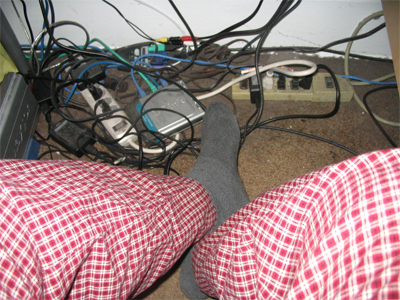 This weekend, I along with a couple dozen others from Howard Rheingold's online community Brainstorms, are having a bit of photojournalistic fun as we document our lives in pictures. This is the third annual 'Daypix Weekend', and since it's the beginning of spring break I thought I'd introduce the idea to my blogpals and readers. The Brainstormers are from all around the world so that private showing should be a blast.
This weekend, I along with a couple dozen others from Howard Rheingold's online community Brainstorms, are having a bit of photojournalistic fun as we document our lives in pictures. This is the third annual 'Daypix Weekend', and since it's the beginning of spring break I thought I'd introduce the idea to my blogpals and readers. The Brainstormers are from all around the world so that private showing should be a blast.
My first entry reminded me of the old canard about bloggers in their pajamas. I got up early this morning because I couldn't abide the fact that my big spike in traffic coincided with a dead spot in my verbal flow. So I'm getting the big volume and haven't delivered up to my normal quality. Of course, the new job with its 250 mile commute has a lot to do with that, but also the inclusion of my comic over at Punditdrome is introducing several new wrinkles to my otherwise smooth routine. I created and am already considering the decommission of a new blog dedicated to the comic strip. So a few things are in the air, but I'll be back in swing shortly.
March 18, 2005
Friday Fragments
Assad The Lesser
If the question of Syria can be reduced to one or two factors, then Joe Klien's interview with Charlie Rose provided a good portion of the clue. Bashir Assad is getting pimpslapped around by area leaders as well as elements within his own country and government. As a president second guessed by his own government, suddenly Syria doesn't seem so dangerous. On the other hand, it becomes a bit less predictable. From now on, assign few calculated moves to Syria.
Powell The Lesser
It seem remarkable how seldom we've actually heard from Michael Powell these past 8 years. Now that he's heading out of the FCC, he can surely have just about any job in the world.
The Fabulous McCartneys
Notariety is a bear, but rarely have I seen such grace under pressure as that evidenced by the McCartney sisters in their NPR interview Wednesday. There's something about them which makes me think about English speakers as a civilization rather than as a bunch of disparate people around the world. It occurs to me that everyone's English has improved dramatically in the past 50 years, or at least American reporters are doing a better job at finding foreigners who speak well. Be that as it may, they exemplify with great precision the attitudes this White House has most certainly expected from Iraqis.
March 17, 2005
Freakonomics - First Peek
In my current reading, I've gotten an advance copy of Steven D. Levitt's new book, Freakonomics. The title is just weird enough to draw a good-sized audience of non-wonks, and the folks at William Morrow have got their audience right. Anybody who likes Michael Crichton, Oliver Sachs, David Brooks, Andrew Hacker or Malcolm Gladwell's eyes for the interesting will be immediately sucked in.
Co-written with Stephen J. Dubner, Freakonomics is a smooth and entertaining read. Levitt has the mind of a scientist, but the eye of a curious wanderer who suddenly gets hooked on a subject. Anyone who reads blogs on the regular will recognize his willingness to take a curiosity and turn it inside out for inspection. But Levitt brings the rigor of statistics to bear on this as well as a disdain for simple answers. In many ways his discipline to go beyond the obvious is reminescent of business researcher Jim Collins the author of 'Good to Great', with the caveat that Levitt is a one man operation. If and when he gets to assemble the kind of team that Collins had, we will be in for a whirlwind of revelation.
Levitt is a little out of his depth when it comes to information theory, but he gets the fundamentals right. He makes timely observations about insider trading, citing Martha Stewart, but broadens the scope to look at the incentives of more garden variety professionals who interact with the public. I would have thought that the most interesting aspect of the Stewart, indeed of any high profile case has to do with identifying how any number of relatively weak individuals are suddenly rendered powerful by dint of their possession of the right info.
I've been very busy the past few days since I got it, otherwise I'm sure I would have finished by now. It will be digested this weekend. On the whole I think I will recommend it highly, and I guarantee that at least one of Levitt's stories will become the new common wisdom - like IBM's Diapers & Beer story.
March 16, 2005
Metrics for the New Blog Millenium
I had no idea, all day long that I was getting a spike over the Blog Patronage post. Cool beans. I think it has been my biggest day since Cosby and/or Nick Berg. So while I actually did no surfing today (which is a good idea on your first day at work), I did jot down some notes about metrics for blogging. They are as follows.
Here are the adjectives: Here are the metricsProfligate: Average blog posts per day.
Profound: Average trackbacks per post.
Popular: Average visits per day (already in TTLB)
Pervasive: Links per blog (already in TTLB)
Populist: Average comments per post.
Verbose: Average words per post.
Reverent: Average # of external links per post.
I'm not going to go to any great lengths to defend these and I think they're pretty self-explanatory. Anyone with a modicum of spare time and SQL skills could manage the programming, and you know that bloggers would break their necks to find out such data on their blogs. I leave the rest as an exercise.
There are a few other dimensions of blog performance which could be subjected to numerical analysis, but they would require a bit more resourcefulness. For example, how may RSS subscribers does a blog have? How many mentions does the blog get by A-List bloggers? How many mentions by mainstream media. I mention these without having paid much attention to Blogshares, or the recent rates at Blogads.
Again, I happen to think that blogs are primarily subjectively valuable and not objectively so. But we do play the game of popularity and many bloggers do so for money, just like the mainstream media. Anyone who lists themselves in Technorati, or any of the services plays the ratings game too. Maybe, just maybe we could improve it so that we know more than just popularity and pervasiveness. This is in no way to knock NZ Bear or the Ecosystem. He's the JD Power of the blogosphere and I think we're very fortunate to have that free service. So this is just my modest proposal.
About Last Night
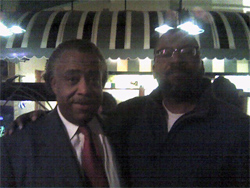 Yesterday was one of those spellbindingly incredible days in which so many things happen that you don't know where to start explaining. Lordy I've got some explaining to do. Unfortunately, I've also got some driving to do because today is my first day on the new job. So here are some bullet points for you to consider and me to remember as I put together the pieces of a remarkable evening which started on the balcony of a 70 year old woman and ended up with police circling at 2am in a parking lot in Long Beach.
Yesterday was one of those spellbindingly incredible days in which so many things happen that you don't know where to start explaining. Lordy I've got some explaining to do. Unfortunately, I've also got some driving to do because today is my first day on the new job. So here are some bullet points for you to consider and me to remember as I put together the pieces of a remarkable evening which started on the balcony of a 70 year old woman and ended up with police circling at 2am in a parking lot in Long Beach.
Brokerage Politics The Chinese Backdoor Weigers The Power of the Mic Lahore, Karachi, I Can't Remember Which A Guy Named Julio Four Black Men With Shotguns That Girl's Dope The Quiet Man in the Blue Blazer Strata & Freakonomics House Bugs Bunny & Grenada, Mississippi These Black Kids Don't Look Sick The King & Queen Charlton Heston A Fistful of Chest Hair April First
It appears that I will be expanding the Circle of Trust. Last night was rather magical. And the picture? That's me on the Right.
UPDATE: OK I'm just a big tease, but actually all the conversation was with a gaggle of old and new academic friends, led by Spence, whom I've known for a decade and yet never met face to face. The event was out at Whittier College.
Spence had spoken the night before, and Sharpton spoke last night. After the show (which I missed) was over, we retired for dinner across the street - we meaning the faculty sponsors of the event, friends of Spence and some folks who had apparently come with the Rev. His long table was full and he looked a bit peaked, and so I wasn't about to make a geek of myself, even though in the end I did.
I wasn't really interested in engaging the Reverend because I don't get bent out of shape that he does what he does. I get bent out of shape because I percieve that too many Americans consider that there is no alternative.
Now Spence is many things besides a very well-rounded individual for one who has a PhD, but one thing he has got in spades is a finely tuned bullshit detector. And he's not afraid of coming with the hardline if he thinks people don't merit political credibility. Now credibility isn't always about the science of political science, and some might call that gullibility, but when it comes to policy, I think anyone would be a fool to doubt the man. So when he said something to the effect of 'Say what you will about Sharpton, he is one of the top five orators in America', that distilled something which I've been mulling over.
One of the bullet points above was that if you're holding the mic, everyone else is subservient. There is power in center stage. And you don't get to be the media magnet Al Sharpton is without having mastered the art of that thing called mediagenics in this country. The American media can destroy any one of us in a heartbeat. Say what you will, but Sharpton has learned all of those lessons and he is a uniquely American creature, which is one who can alter, however slightly, the national dialog through his ability to withstand that awesome beast called the mainstream media. And so my man Spence thought twice of trying to cross Sharpton, when Sharpton held the mic.
Much of that discussion brought to mind what Jimi Israel wrote of his appearance on TV and I also think about what my blogsister LaShawn Barber and blogbrother Michael King have learned in their more frequent media appearances. We talk back to the radio and TV in our pajamas, but it surely is not easy to deal with that camera. So yeah, that's my faux pas for not coming a lot cleaner in that crappy picture at the top of the page, then again I used the cheap digicam on purpose.
Of that I thought of simply publishing the shot with the phrase: "This is the difference between black Republicans and white Republicans." But I stopped short in recognition of Christie Todd Whitman's campaign for governor a decade ago. I was mad at Ed Rollins back in those days, but now I have a different agenda.
Bottom line on Sharpton. I think he does, as an orator, exactly what an unelected person should do. Speak out on issues. It's clear that our system benefits from all the rhetorical monkey wrenches. That makes him a politician I'm just not sure that makes him a public servant.
After Sharpton and the quiet man in the blue blazer (Secret Service, no doubt) left in the limo, I literally had one of those rare evenings when the conversation sparkles so lively that I didn't jump meta and fall into my 'space alien observing strange earthlings' subtext. We were a lovely bunch of coconuts and were still carrying on in the parking lot off Broadway and Pine in the LBC at two in the morning. What a great gang of folks.
March 15, 2005
Urban Hacking, Effete Republicans & The Spirit of Mega
In the coming weeks and months, it is my intention to get back in shape and do a bit of urban hacking and amateur spyjinks. I think it's an excellent idea for a number of reasons, not the least of which is that, well, every once in a while I get my fill of bourgie bloviation.
I came across this notion in three or four stages. The first was the realization that Glenn Close is going to play a detective in this season of 'The Shield'. Make sure to get a season pass on that. She researched the project by spending some time with an actual real woman cop in NYC. The second was the idea of 'Blame the Enemy', which I will post in the future - stay tuned for that. The third has to do with my continuing security focus, and the fourth with my discovery of yet another blog I wrote several years ago in the months leading up to September 11th.
That blog was called 'Obscura' and I'm republishing it here. The archives may or may not work as of this publishing. Speaking of which, Blogger has gotten its act together since I last checked. I'm liking it a lot more and will probably do some serial hit-and-run blogging.
One of the Obscura posts led me back to Jinx Magazine. A very little known fact was that I used to be a tagger back in highschool. That's right, I belonged to a prep-school cholo-wannabee gang, and we tagged various joints in the very old school style of pre-wildstyle graffiti. Anyway my name was Jinx, so the site appealed to me immediately. Then I discovered what they were all about and was immedately transfixed by stories that took me way back. So I predisposed a portion of myself to GPS hacking, dumpster diving and like activities. Intellectually and culturally these fit nicely into part of the 'new tactical', and 'blackneck' themes. [Un]fortunately as the case may be, I have not pressed any compatriots into this manner of sport.
In reading up on the highlighted hacker of the day, Citizen Chris, it occurred to me that there's a bit of an anarchist component in this cohort. Chris writes with a bit of snarky irony:
There is this vast Republican conspiracy to underfund the entire infrastructure of the nation. Few repairs are made to highway systems so that more Americans are stuck in gridlock and thus have more time to be brainwashed by the Limbaughs, O'Reilly's, and Hannity's of hate radio as they sit and stew in traffic. The anger of the horrible commute creates a Pavlovian conditioning situation in which hatred of the gridlocked commute is transferred to Democrats, liberals and the their vast evil communist plots.
Tsk.
Be that delusion as it may, there is an element of truth in it, which is that they are talking about a class of Republicans that do exist out there. One of 70 classes I'd imagine. But for those of us Republicans who own boots, workgoves and chainsaws (you know it!), there's a bit of an attitude adjustment we have yet to deliver in the national electorate.
So I'm digging the angle of how close knowledge, power and (for lack of a better word) transgression are to what is generally percieved by dainty people to be criminality. The line is not so thin as many would like to think, and those of us whose responsibility it is to make things work, know very well what it would take to sabotage those very things. But we never do, we're responsible and we consider it our duty to remain that way.
America has millions who own 4WDs that never get engaged. And I think there is an image that youth has that only lefties and anarchists get dirty. Those on the right who do are all either 'stupid rednecks' or 'gullible soldiers'. Whatever to that. I'm going to have fun getting dirty and going to places where it is expected that only delinquents and homeless people are. So I'm looking, through Jinx, for folks in LA who won't mind getting their feet wet in the LA River. I know just where to start too, Civil engineering departments.
BTW, Chris, misguided as he is politically, has admirably gotten himself a 100-ton master's license. (Google that one your damned self.) Reminds me to call my boy Bernard who used to hang out with Liberian freighter captains.
One more thing. Remember the Spirit of Mega.
Blog Notes
I'm listening carefully to my readers and critics, and am going to make a strong effort to make reading the comic easier, and looking at syndication possibilities. The change from orange to green is just the first of a few changes around here. I think the result will be a better blog experience for all.
Stay Tuned.
March 14, 2005
Blog Patronage: A Token of Affection
Who is the number one black female blogger in the world? That's easy. LaShawn Barber. Why? Because she's untiring in her efforts to get her name out there, she has a compelling blog, and dammit people like her. I'm picking up on her meme today because it's a real enough one to discuss at length, but also because I think it's time (again) that black blogs get their due.
Just the other day, I ran into some character who thought he was the first black blogger from Detroit. As far as I know, the most popular black blogger from Detroit has been around for at least two years, and got a lot of coverage for an interesting incident that I won't go into. My point is that black blogs have long been around, the question is who is paying attention, and why or why not.
We are already learning something deep about the dynamism (or lack thereof as it were) of marketshare in the blogosphere. Because of the ways and means of linking, there are blogs that are 'popular' even though nobody is writing on them. For a long time I complained about Rachel Lucas being a higher order lifeform in the TTLB Ecosystem than I was, even though she stopped blogging for over a year.
In the blogosphere there is a real contingency of patronage. I'm not sure that everyone is so eager to say so, but it's real. As real as is the term 'blogosphere' is the term 'blogfather'. Ask any blogger of substance, and if they're honest (and are abetted by a technical clue or two) they'll know which other blogs send them the most traffic. They will also almost surely know who gave them their big break and under which circumstances that occured. There is not a conspiracy of white male bloggers, and I'd guess all of them would be loathe to admit any such clubbiness, but all popular bloggers belong to a club and none of them are about to delink anytime soon.
Dead White Male Blogs - The Elvis Factor
One way to look at the question of whether or not there is a conspiracy to keep all the goods is what [white male] bloggers do to police themselves. I think they don't. I know for a fact that there's a lot of dead linkage out there that nobody really trims, and that this ossifies marketshare. Once popular, always popular. It seems to be a one way function from which few people fall. DenBeste at USS Clueless has over 800 links and he hasn't blogged regularly for many months. In fact, I've been checking his latest post as I write this one and note that he has gotten the equivalent of one week's Cobb traffic in about 90 minutes. Here are several other dead blogs that still suck up oxygen. (I'm giving Andrew Sullivan a pass)
Lefty Destroyer Jeff Aaron's Rantblog Calpundit
I could go on but it's boring and time-consuming work to slueth through the Ecosystem to see which blogs actually exist. This only strengthens my point.
Juan Cole & Meritocracy
I'm one of the people that happens to think that Juan Cole is a brilliant idiot on the level of William Shockley. He is one of those people of which I think the poet referred to as knowing the cost of everything and the value of nothing. In particular, I am speaking of his determined effort to sabotage the moral reasoning for the Iraq War with his incessant and well informed sniping. For this, Cole has generated a number of rivals and enemies in the blogosphere. There are others, Kaus, Kos, Atrios. I think that if the blogosphere were to be considered a meritocracy, Juan Cole would still be near the top. The reason for this is that Cole has reached the tipping point at which he is no longer dependent on the politics of blogrolling. Which is to say that he gets plenty of traffic without mutual linking, without supporting comments and without trackbacks. He's out there, unassisted, influential.
The rest of us poor slobs, and I would consider myself a poor slob on the order of Unfogged, although I have been compared to Lileks, need mutual blogrolling, league membership, comment traffic and other methods of enlightened self-interest to maintain or improve our status as noteworthy and readable. These practices, affectionately known as 'link whoring' are a stock in trade among the B-List and Blog Rabble which I would consider to be anyone less evolved than a Primate in the TTLB Ecosystem.
The Gratuitous, Qualified Pitch
At Cobb, I have consistently refused advertising. I think ads would make my site look hideous, they add nothing of value, and I couldn't possibly get paid enough with my current volume to justify them. I also haven't advertised. I simply can't afford it right now, plus I can't think of a cool enough slogan at the moment. I am also already a Large Mammal and living large is enough for me, sorta.
On the other hand, I do think that we're in a state of disgrace when it comes to the national recognition of black bloggers. As pitiable a situation as that is, I don't know that there is a list or that I'd want to be on it, considered separately. In other words, I know that when it comes to pure bloggy merit, there are a lot of African Americans that are deserving of a lot more traffic and recognition than they get, and I think Cobb ought to do a lot better than it does in terms of traffic. But, I'm not sure there's a simple solution.
I've decided to do something about that with regard to advertisement, but what I haven't really considered until now is the power of Affirmative Action, or more properly speaking: Tokenism.
I hereby submit Cobb for the consideration of all A-List Bloggers as the Head Negro in Blogs. Send me your poor, huddled vanillified readers yearning to breathe diversity. I lift my banner beside the olive greed sidebar! But since I also link to more black blogs than the average bear, I know the trickle down will continue.
I do so with the confidence of years of blogging and writing online that have thus far so nobly advanced me. And I also do it as a publicity stunt, and further and most importantly I do it because I understand that the dynamics of patronage in the blogosphere is the most important factor in launching a blog's popularity. If anyone anywhere today is saying that blogging is a white male domain, then they clearly do not know about how huge the blogosphere is and how many women and non-whites are active and popular. But there is the big unanswered question about whom the A-List Bloggers consider to be representative of those outside the top of their blogrolls. I've been a hot blog launched by DenBeste and by The Agonist (my blogfathers) when they were at their peaks, and I certain am appreciative of that, but I have never before sought nomination. The very persistence of the question of black blogs amidst 'white male hegemony' demands that the real black bloggers please stand up, and it's about time. But you and I both know that the A-List Bloggers or the MSM have to say it's an issue before the average blog reader, or average American takes notice and says 'hmm, I wonder...'.
Bottom line, merit in the blogosphere is what the top bloggers say merit is, and they allocate it out by referring to blogs with which they are engaged in conversation. I don't think that's going to change much. Blogs move not only on their own power but on their ability to get big bloggers to compete, cooperate or otherwise notice and comment on them.
And the People Say..
On the other hand, the phenominal rise of LaShawn Barber over the past year puts a distinct question to me, which is that while she has gotten very popular, most of us, her mates in the Conservative Brotherhood have remained pretty much where we were. Although I can speak only speak for myself, the big rush has not come, and trickle down just might not be real. So why second guess the market? Perhaps it's altogether true that people are indeed finding exactly what they want in the blogosphere from blacks, whites, women and everybody else who identifies some orientation to their writing. There isn't going to be a technical revolution in blog traffic monitoring, and the 'sphere is mature. All change from here on out is going to have to be phenomenon-based.
But that does not dissuade me from believing that Cobb and other purposefully black [political] blogs could use some publicity. We have something to say and we're worth reading. But until somebody with marketshare says so, we remain as we are. Obscure, poor and somewhat reconciled the the fact that our say so only reaches a paucity of eyeballs. And so we keep stepping.
Disclosure: According to the TTLB Ecosystem, Cobb ranks 1510th in average daily traffic with 137 readers per day. Cobb ranks 721st overall with 184 links.
More:
Technorati: blogging_while_black
SXSW Liveblogging: Blogging While Black
Snarky Commentary at The Captains Quarters.
Harvard Admission: Do Not Open Until Christmas
Like most folks in the news-junkie class, I found out in the past week or so that Harvard busted some 'hackers' who apparently broke into an Admissions database. The story was somewhat beneath my radar for caring and I only made a mental note in passing that it sounds like another blow against the ethics of certain of our future leaders. There was some quibbling somewhere and then the story came out. All 119 students accused were summarily rejected by the University. Then I found out more.
Over the past week I have been literally obsessing about security (I'll explain that later) and have set up a dozen or so new RSS feeds from security blogs. I have learned so much! The latest of these informs me that the 'hack' was accomplished by twiddling with the URL at the website. In other words the security was so stupid as to be inconsistent with the very idea of secured information.
It turns out that all applicants to the Harvard Business School were given accounts on a website:
HBS interacts with applicants via a third-party site called ApplyYourself. Harvard had planned to notify applicants whether they had been admitted, on March 30. Somebody discovered last week that some applicants' admit/reject letters were already available on the ApplyYourself website. There were no hyperlinks to the letters, but a student who was logged in to the site could access his/her letter by constructing a special URL. Instructions for doing this were posted in an online forum frequented by HBS applicants. (The instructions, which no longer work due to changes in the ApplyYourself site, are reproduced here.) Students who did this saw either a rejection letter or a blank page. (Presumably the blank page meant either that HBS would admit the student, or that the admissions decision hadn't been made yet.) 119 HBS applicants used the instructions.
This reminds me of an old Bill Cosby story about his mean Uncle Charles. All year long Uncle Charles promises little Bill that if he's good, he's going to get a bicycle for Christmas. As the holiday season rolls around, little Bill asks if he has been good enough. Uncle Charles plays coy, saying nothing, but the twinkle in his eye suggests that Bill will be riding happily on Christmas Day. As the day gets closer, Bill pesters his uncle more and more, until one day he does so and upsets Uncle Charles' drink. Uncle Charles, in a fit of rage says "Yes I was going to get you a bicycle, but now you just ruined it." Bill is crushed.
This is clearly cruelty and it is essentially no different from what HBS has done to its applicants. It had made a decision upon the basis of what the students had already accomplished, and then arbitrarily extended a new 'ethics' criteria based. I don't see a way that HBS can wiggle their way out of this. If the decision to admit or reject had already been made, the application of additional contingencies represents a breach of good faith and draws suspicion on the integrity of the decision process.
That admissions status was available to website members when it should not have been is a technical problem, but it also represents a flaw in the admissions process. Clearly there were significant reasons why the ApplyYourself website was built and populated with student's personal information. It's reasonable to assume that chief among those reasons were transparency of the admissions process and speed of delivery of information. Two steps forward. But too much speed and transparency costs a decision reversal? After all, whose information is it anyway?
Harvard hid the status of these applicants in plain sight. It invited students into a private room with their name on the door ostensibly for the purposes of giving and taking pertinent information. In one corner of this room is their acceptance/rejection letter, addressed to the applicant with the implied warning, 'Do not open until Christmas'. That's cruel.
Understand that it is a non-trivial process to get information from Harvard's Admissions Committee, whomever they may be, onto a third-party website. Whatever that process may be, it is certainly more complicated than stuffing envelopes, stamping them and holding them to be mailed. Nevertheless, by sending this information to the third-party who is doing the work of adding content to the website, Harvard was waving it under the nose of the applicants. I grant that using reasonable security would have solved the technical problem, but that doesn't alter the fact that withholding the information due to applicants is an irresponsible injection of drama and punishing those previously accepted is harshly cruel. Harvard clearly was not administratively ready to modify its admissions process to include this sort of website. The ironic result is that aspects of its process have become embarassingly transparent.
Harvard should reinstate the students who were previously accepted on a deferred admit basis, fire ApplyYourself and keep all further admission information on paper, on campus & under lock and key.
Good Life Good Death
(from the archives, Dec 2001)
for christmas, my brother deet bought a book called 'good life, good death'. it was written by the 13th nephew of the dalai lama. he discussed a bit of it with us last night. i realized that my conversational skills have declined. i don't use them at all - i just write lowercase online. nevertheless i was able to witness the transfixing effect of these eastern mysteries upon him.i chimed in clumsily about karen armstrong's biography of bhudda which i am 3/4 finished. the pearls of wisdom burbled out of my mouth in a slurry. one of the kids yelled, or dropped punch on the carpet and the moment was lost.
i tried to recapture the moment by starting the conjecture that we are engaged in a clash of civilizations. how could islam beat the west? the answer had something to do with 'they don't value individual life like we do'. david got us started talking about our military policy of saving every man, and the powell doctrine, as he recounted a friend of his ability to swim 21 miles in the open ocean with combat boots on. it went on for a decent while.
black wedenesday hasn't happened yet. so i wonder what i'll be able to say before people care to prove that america is actually always and everywhere acutely aware of any eventuality. our problem is broadcasting and capturing the attention of people whose values we will change in the moment of need.
the buddha says that pain is unavoidable. this is also revealed in my 15 year old diary. facing pain is a universal challenge. as i embark to make myself an appropriate middle-aged middle-class existence i find this appealing. i always sought to avoid the fate of characters in martin amis' fiction. but now i am finding it in my heart to wear a jolly give a shit attitude and integrate it into my daily smile. i am almost ready to think of america as my very own little ghetto. avoiding pain is avoiding life. it is the attempt to think your way out of every problem, it is the attempt to institutionalize civilizing forces. it is the attempt to extend life. but the buddhais convincing me that life is in the moment and institutions are all vanity.
there is no such thing as patriotism. that's why nobody agrees on what it is. patriotism is affinity to the state, and the state is an institution, a momumental edifice of artifice, a construction of theories and anonymous fidelities. it isn't what it was 20 minutes ago - it lies in the attitude of a million people trying to say what it means to them. the constitution is artifice as well, a representation of a dynamic spirit of love and respect which loses all energy once abstracted to paper. the man who drunk wine at jefferson's table might have an idea what this thing was all about, but unless you are he reincarnated, you will not know. it won't be your story, and in the end that's all you remember. you remember the man who pulled you from the burning building and the pieces of your leg hanging from the extruded aluminum spur. you pledge your life to the one who saved yours. that is because pain is universal and freedom from pain is universal and the only act of civilization is life-saving. not patriotism. not the abstract. wittgenstien fucked us all over when he said that words are deeds, and even he knew that he was full of shit, because he had to pick up the poker at the moral science club...
i like this wooly little forum. but we too are vain. in my new neighborhood, i'm going to teach my neighbors how to chop wood. a deeds exchange will be more useful than a words exchange. that's why going to church is meaningless except for the music. you cannot just sit and recieve wisdom or blessings. you have to be blowing air through your body and heaving it out. you have to be exercising your fingers and feet and pulling out all the stops and bobbing your head and feeling the resonsances of the low notes. making music is a deed. (last night at the party, my job was to keep the music playing and the fire burning). hosting is work but also a pleasure - it is better to be the party giver than to be the fetted friend. the moment is found in alleviating the suffering of my guests. the conversation about religion and politics was dead but people actually danced.
you have to find your own way. words are only useful inside your head. you only write them down to remember. but now every word you ever wrote is trying to own your spirit, but that was 15 years ago. google doensn't know shit. google is just like nbc, cbs, pbs all of them. it's just trying to make real a surplus of meaningless abstracts. it's trying to force its context on you. it is a haunted house jam packed with a surfeit of restless spirits trying to inhabit your body. it doesn't matter that it was 'you' that wrote it - those were 15 billion wholly other cells, not you. you are now, and the more time you try to convince yourself that you are the same you were before, the more words you need. go right ahead, try it. make a word harness. if you're crafty maybe it'll fit and lead you in some direction. but you'll go wrong because the use of words is for them to be observant not reflective. there is a reason time moves forward and not backward. you cannot be institutionalized without words. all that effort to maintain a static fiction, all those applications, all of those entry level skills, all of those poor saps trying to conform to the ways and means of old spirits, old documentation, old manuals with none of the inventor's spark. get you head rid of the ghosts of christmas past and be more mindful of the present. you'll have to find your own way. tradition is a trap.
the job for computers is to keep bartleby free. every institution needs a million bartlebys. i struggle to take his scrivening spirit and bottle it in silicon. then he can be free of it and live in the moment. once the building is empty of humans, all laid off and the principals gone to brazil, let it crash to the ground. who cares?
March 13, 2005
Come Back Five Years Ago
I just discovered that my first blogs have been retained all of these years. Whoda thunk? So my next little project is to integrate the past into this current blog. So if suddenly you see some interestingly odd stuff happening with my archives or RSS, now you know. You'd think I'd give props to Blogspot. OK I do, but they still don't get to host it.
Robots (Starring Robin Williams)
Is it me or is Robin Williams just too manic and full of himself?
I think I've listened to my last unsubtle 1.5-entendre. After about an hour of it, it goes downhill. 'Robots', at a theatre near you, is about as formulaic as it is possible to make an animated feature and still have it actually be funny. But after it's over you feel like you've been tied down, sent through an MRI and tickled strategically.
But I'll tell you what it is that irks me where I have no business being irked. It's the unrelenting reactionary anti-corporatism. Jeez what a load of shallow grease. I think that as time moves forward, there's a clear difference between the writing at Pixar and everywhere else. Pixar is the class act. Everybody else sucks. I mean if you're going to launch a screed against corporate greed, do it with real characters, not a ragtag gang of automatons with less personality than the crew at the Rugrats (or the Teen Titans, or Jimmy Neutron, or The Fairly Oddparents, or Spongebob Squarepants, or Monsters Inc, or half a dozen other kid-friendly joints).
I lay odds that this whole mangled affair was the brainfart of Robin Williams who must have had a bet with somebody that he could do half his routine in drag without offending anyone. It's not offensive to anyone doesn't know the difference between a hero and a sidekick, or people too slow-witted to know that there are other moral forces in the world besides the violent rebellion of the angry masses.
It's Robin Williams all over the place overacting roughshod over what might have otherwise been a charming movie for adulds as well as goofy fun for kids. Instead, Williams runs his robot through at least 20 different voices without so many as 3 costume changes. Instead of a flawed hero overcoming his own insecurities, Rodney Copperbottom (oh yeah him, this is his story right?) is just an ordinary guy trying to fill a need; Robin Williams as 'Fender' is the flaw.
Ick. The more I think about the spindly legs upon which the clunky morality of this tale does the robot, the more I hate thinking about it and the less I can recommend it. Not that it's not funny, but it's fart-joke funny and I can only take my debasements in pairs. If the ensemble would have gelled, if only there had been more to the story than just plot, if Williams would have just fit inside his character, if Halle Berry had said more than 100 words, if somebody could explain why Big Weld was so fat...
Giving credit where credit is due, I can't recall the last evil mother working through her pretty boy script since The Manchurian Candidate. Nice touch. A passive-aggressive momma's boy - the only character with a tie. On the other hand, poor Rodney Copperbottom, not only does he not really get the girl (or if he does, we can't really tell which one), but he does the whole thing for his dad.
This is a film with no real heroes, and in that regard it is inferior even to 'Shark Tale'. Yes that's right, Shark Tale is superior to this bucket of bolts when it comes to the story.
Where Robots shines is in its slapstick. There's a brilliant scene in which Copperbottom gets magnetized - classic. It does a pretty decent job making jabs and takeoffs on other movies, but seems a bit shy to lay it on as thick as it should have - well with any actor other than Williams. Aunt Fanny is as big a crackup as she should have been, and the fart and booty jokes are top shelf.
I swear I hope this flick doesn't get past the DVD.
March 12, 2005
Cobb v Schneider
In a rare moment, I entangle myself on someone else's blog. In giving advice to someone believed to be a fifth grader, I whacked a manifesto by Dan Schneider reference by Drezner. Of course, I had to use fifth grade English. Schneider whacks back, so I'm bringing it over here for grown folks.
4)Cobb:
Pt1- I state 'However, not many wars can claim to be relatively clear cut as those two.' What do you not understand about the qualifier 'relatively'?I think that a moderately proficient historian can come up with as many complications on American involvement in WW2 as you give for Iraq. In fact a cursory view would suggest that the same ones could be employed. I simply think you picked a very poor premise, and I like Hitchens and symbolic logic wonks are particularly attuned to the fact that a false premise taken as axiomatically true can logically support any conclusion one wishes.
Pt 2- I actually grant the Pres the best of motives, and defend the First Lady, if you actually read the piece. Even granting he's simply wrong, the war was and is unsupportable- as I show by vetting the Joint Resolution. In fact, to show how off-center you are, as are Leftists, when I've tried to send or link the piece to political/anti-war websites many refused to allow it because I wd not declare myself a Liberal and/or they did not like that I did not solely blame Bush for the war, but also the cowardly, anomic Left. And it's worth noting that I differentiate between Cons & the Right & The Left & Liberals, because I quote from a flaming Reaganaut who is against the war, as are all true conservatives. You can call yourself a con and be for the war, but that ain't gonna make you one. Both extremes are noxious, but the Right's worse cuz they're the powerholders who've consigned so many to needless deaths.
Define 'needless'.
I think that the reasons for and against the war stand or fail on their own logic, and I am one of those who detests the idea of reverse-engineering ideology from one's affinity or aversion to the prosecution of this war. In this, I am saying that geopolitics are different from domestic politics and I don't buy that one's position on the war should put one into a proper square back at home. Nobody on the Left suggested we shouldn't war because somebody might get tortured, but suddenly it became derigeur to cite Abu Ghraib's inevitability once news broke. That's not Left, that's reactionary. It's one of the reasons I bring up Hitchens whose position on an American imperial imperative stumps most folks.
Pt3- the piece is subtitled as an Attack, but even so it is open about it and states '6)I hope this essay can become a template to help argue the Anti-War cause against the incessant Orwellian revisionism and lies that are fundaments needed to propagate war, regardless of whether your opposition is based in conservative or liberal politics, or mere pragmatism and a rejection of deceit and delusion, as mine is. I offer specific talking points, often apolitical, and provide sloganeering hooks to win converts.' I am up front about my aim, far more than you are in this post when you claim, 'I strongly believe that the author believes that anyone who disagrees with his position is evil, stupid or both.'
I find it very difficult to believe that anyone who has read the PNAC manifesto and understood neoconservative sway over GWBush's foreign policy would suggest that the ulterior geopolitics involved were not transparent. That is to say that anyone who took seriously the neologism of 'WMD' as proximate cause for the engagement is either starkly fresh to America's long-term interests in the region or precisely the type of political naif for whom rhetoric is dumbed down. In other words, I dismiss as naive everything that suggests deception, dishonesty or Orwellian revisionism and lies were part of a conspiracy of post-hoc rationale. A final confrontation with Saddam Huessein was inevitable. I like Scott Ritter's take. (http://www.mdcbowen.org/cobb/archives/001651.html)
I think your article does a whole lot of piling-on and engages in a surfeit of short paragraphs which don't stand on their own, but when taken together appear to be a mountain of logic. I must confess not to have the patience to check each of your boulders for soundness although I have certain piled together mountains of my own over time. But I think you wanted to bury us all at once and/or force us to deal with the mass of rubble. Sorry, not all of us need to be attacked.
As time allows, we can actually whack at the boulders over here. It's always good practice to talk about the subject when it appears. But let's really get into the White Man's Burden thing, shall we?
March 11, 2005
The ANSR Man
I have accepted an offer from Answerthink.
After about four years of hacking the woods with my own machete, I'm joining a team. This is not the China Deal, which crashed and burned several weeks ago, but the ever tempting Plan B.
It's a reunion of sorts. I'll be working with folks I knew from the 90s and I'll be focusing, once again, on the Hyperion suite of tools. Since I left Hyperion in 2001, they've acquired Brio and Razza, their n-tier product set has matured, their brand recognition has increased and their share price has doubled. Answerthink is the gorilla consulting partner on the West Coast, I'm going to help run things in Southern Cal.
Now this doesn't exactly square with my entrepreneurial spirit, and it's true that I have been quoted saying things like "I'm never going to work for anyone again." In fact I believe that I made quite an impression when speaking of The Vector. Well, the Vector has been deflected, and for the time being, I'm going to be driving a big truck, I'm just not going to own it.
What I tell myself, I believe to be true. Opportunities are forever for those who are prepared. Over the next few years, I'm going to build up this practice, and when I decide to jump at a new opportunity, it will be bigger than one I could have stumbled on with my current associations. Which brings us to that, the devolution of Plan A.
About as much detail as I can say is this. I was to run the IT for a joint venture between some fairly rich and somewhat powerful individuals. Basically a resort in China. I was one degree away from the principal of what looked to be an opportunity to mint money. There were connections to West African gold & textiles, The Chinese Communist Party, Hiphop celebrity, New York Advertising and London International Banking. It turned out that this was not about herding cats, but herding lions, and our commander in chief was a little too much chair & whip and not enough care & feeding. The problem with such an approach is that while it might work for currency trading boiler rooms and the Russian Mafia, it doesn't work with the international Jet Set, of which the partnership was comprised. After an unfortunate series of events, people walked out in a virtual cloud of fists and lawsuits.
The whole thing sounded to good to be true for a long time. However it wasn't. What it was, was too good to be easy, and it has been a singular proof to me that character counts a great deal more when it involves Money, Power or Influence. Corruption is little more or less than the willingness to be above caring. They say power corrupts but it is not power itself that corrupts, power simply amplifies personality. Small flaws in character become writ large. It's just like Shakespeare. The powerful or rich needn't become saints, they only need to recognize commensurately what broken promises and distrust mean when it involves so many more resources. When you have an order of magnitude more choices than the average bear, the right thing seems of fractional use. In fact, it becomes that much more important.
So I'm chilling the international and pumping up the local and soon to be regional. It's better to be the king of a small hill than a prince halfway up a mountain. I am thrilled at the opportunity to put the blue shirt back on. I have spent most of my professional career involved with management consulting and the pure golden geekiness of BI enterprise software. Answerthink also has its own real management gurus - The Hackett Group, so it's much more than a body shop. I believe they have the right combination of tech skills and business brains to be superior, plus I know, like and respect folks in the division I'm joining which just happens to be growing at 25%.
Hey. This means I have to redesign my professional web page... yike.
March 10, 2005
Microsoft Buys Groove
Now here's something to be interested and perhaps very skeptical about. One way or another it's a big deal. Ever competitive, MS has just stuck a sword through the gut of Chandler. In the battle for superior office collaboration, Ray Ozzie smashes Mitch Kapor to the carpet. The question is whether or not Groove will survive integration with the next version of Windows.
My prediction is that it will be stunningly complex on the back-end and fabulously friendly on the front. I say this having successfully Grooved for several months last year. Right now, the integration of Groove and Windows is flawless, down to the 200 Registry entries, and the changes to Windows Explorer. In fact, it's rather difficult to get rid of all the tentacles Groove inserts into Windows. Groove is a collaborator's dream in that it obviates the need for File Servers and Briefcases. Everything is synchronized nicely, in near real time.
I have yet to come across an implementation of Windows Active Anything that works very well across an enterprise. Groove has the best chance of anything yet. It is a secure and non-clunky way of enabling collaborative objects.
The best thing about the Groove desktop is the interface. It is good enough for people to be immediately productive. It has taken Ozzie and company several years to accomplish this, and their latest version is truly all that. I've heard somewhat stupendous things about WebDAV, but I'm not holding my breath. What Linux does on the desktop is cool, but this is the killer app.
I predict that Win32 developers will start creating sharable objects for Groove as soon as humanly possible, and that it marks a return to fat-client basics. What is Groove's competition? Web Services. I have a feeling that a lot of .Net developers are going to take it on the chin.
Groove is a big enough and killer enough app to make Windows a much more attractive proposition, and no there isn't a Mac version. I have a feeling that if it gets deep enough into the OS, it's going to be a whole new world. Groove has the capacity, in my estimation, to be for Windows what the combination of Aqua and i-apps are for Mac, with security and collaboration built in.
My Party Too
Christine Todd Whitman is my new hero. I think she's got the right idea, and I wouldn't be surprised if she becomes the Republican Party nominee in 2008. I'm saying it now, McCain-Whitman.
Her new website, MyPartyToo.com is going to be the focus of a lot of attention if I can have my way. I'm also going to start using her term 'social fundamentalists' to describe my rivals within the party. Listen to what some of my fellow Republicans are saying:
I was as upset as any other Republican when President Bush violated his campaign promise and raised taxes. I strongly supported Newt Gingrich as he tried and eventually succeeded taking control of the House of Representatives. I strongly believed in the Contract With American and the direction our party was going in. Lower taxes, reduced spending, a balanced budget, a populist message, and little regard for the social agenda of the social fundamentalists. Though I am pro-life (with exceptions) that is about as much as I have in common with them. Now it's 10 years later and this is what Republicans are fighting for: - Intelligent Design being taught in science classes - health classes teaching AIDS can be caught from sweat and tears - health classes teaching that pregnancy can result from intimate touching - dismissing the overwhelming evidence of global warming - the destruction of our environment - discriminating against gays and lesbians - big government control over our personal lives - nation building in a country that doesn't pose a threat to America - massive deficits and a larger national debt - almost $8 trillion.
Now that guy is slightly to the left of me, if left means anything as a direction; he's jumping ship. But he's correct. I pick him because he has a laundry list of things that Republicans should be looking at. There is indeed a battle for the soul of the GOP, and it's time for us moderates and progressives to take up the banner.
Like Whitman, I think there is room for social fundamentalists in the party. They've got to be represented somewhere. But the way they are working with their convictions is inappropriate and destructive. It's the social fundamentalists who are saying you cannot be a pro-choice Republican. How can we be a majority party in defiance of 80% of America and the well-tested law?
There is a difference between a social conservative and a social fundamentalist. The social conservative says, I don't support gay marriage. The social fundamentalist says I don't tolerate it, nor people who do. Gay marriage isn't slavery, and Republicans who think they are going to abolish gay life are on the wrong side of history. The agenda of social fundamentalists has entered the realms of fear and punishment, and that is stepping over the line in a pluralist society. I do not deny any American the morality of their convictions, but I cannot abide an agenda of persecution born out of cynical fears.
Whitman has stood up clearly and drawn a clear line. By doing so, she has helped me to realize how long we have been simmering in the pot of intolerance. As I look back at a number of the discussions I've had here about what kind of Republican Party I'm talking about, it has always been clear in my mind that organizations like the Main Street Republicans or the Manhattan Institute were more to my liking. In fact, when you look at the organizational partnerships at Whitman's site, I am more than a little bit jealous. I've been hoping, but not working diligently to get our Old School in gear.
Nevertheless it is clear that the party is contested. America will win when we moderates prevail.
March 09, 2005
Healing, Curing, Black Politics & The Doppler Effect
I found something from the archives that I found particularly interesting. I was actually searching for something on Steven Levitt (the Chicago economist) but found William Levitt (the Long Island real estate developer) instead. Indulge me for a moment:
The early Levittowns also had an ugly secret: no black families allowed. "As a Jew, I have no room in my mind or heart for racial prejudice," Levitt insisted in 1954. "But, by various means, I have come to know that if we sell one house to a Negro family, then 90 to 95 percent of our white customers will not buy into the community. That is their attitude, not ours."
i was paraphrasing levitt in my westbury example because half of my library is in the garage.let me step back and give you my interpretation of the scope of this thread because i do want to engage you on common ground. first off, i contend that the biggest racial problem in america is the institutional racism inherent in segregated housing, and that every major obstacle facing blacks and latinos in particular in achieving social equality stem from the fact that they are living, by and large, in internal third worlds. if you ever hear me say that america is a racist country i am talking about the structural facts of american apartheid. jim crow and racial segregation were the law of the land, and until the overwhelming majority of racial minorities are dispersed into housing built *after* fair housing laws, all those enequities will remain permanent. you cannot evade the fact of white flight, and you cannot evade the fact of ghettoes. by extension, everyone who has participated in this housing market strengthens this aspect of american racism.
that is the short way of saying it. i am in 100% agreement with the theses put forth by glenn loury. here is his piece.
now. there is but one way out of this situation and it involves nothing short of the destruction of the ghetto. this implies mass migration and/or massive transfers of capital. these measures would, by and large, eliminate economic basis of and structural component for racism in america.
both mass migration and massive transfers of capital are, to put it mildly, politically unacceptable. and therefore we have moved from the area of CURE to the area of HEALING. when you move to the area of healing, you address the symptoms but not the root causes of racial inequality. nevertheless, HEALING is an important part of solving the entire problem.
so my approach to this part of the discussion of race first asks the question, exactly how important is healing, and who should be responsible for doing it? i contend that we have quite enough healing, and that our positive attitude towards healing ought to help us focus on curing.
so when i bring up the matters of white flight, segregated neighborhoods, and racist institutions i am pushing the envelope towards the personal. i am asking us to consider the political acceptability of curing. i am trying to get people to accept responsibility for failure to act on a curing basis, and i call into question the rationality of further healing.
--
moving forward, for example, it's clear that a sizeable portion of the electorate has had its fill of affirmative action. i would argue that affirmative action is part cure and part healing. to the extent that it removes people from the ghetto and places them into areas of american that *work*, it is a cure. yet to the extent that it is considered an act of charity and goodwill, of bending rules and making exceptions then it is an act of healing. in the largest scope of things, all of the affirmative actions in america have not significantly changed the relative gap in employment rates between the mainstream and the beneficiary class (except perhaps for white women). so affirmative action is clearly not a final cure.enterprise zones and set asides address more directly the matters of transfers of capital. CURES. and yet the political acceptability of the combination of enterprize zones, set asides AND affirmative action is just about dead. so politically speaking, we are at an impass. american refuses to cure.
so all the healing leftover goes out to blacks and latinos who have essentially already entered the middle class, leaving ghetto residents in the lurch. the only thing left that will help those barrio dwellers are real cures.
The other day over at P6, we got into analogyland talking physics. We screwed up the physics, but the basic idea made sense, which is that the speed of the observer makes a difference in the perception of something that is actually constant.
To put the Doppler Effect into the black political analogy, the economic progress of certain segments of African America skews their perception of Republican politics. If they are moving forward, it sounds good, if they are falling backward it sounds bad. Republicans say the same thing and different folks hear it differently. To extend this metaphor of physics into the quantum realm, whenever a certain group of blackfolks investigates that message, it changes.
Now add on top of this epistemological problem the question of patronage. Let's just reduce it to a three dimensional problem with just a few variables.
Factor One: Progress
Individual Progress v Group ProgressFactor Two: Racism
Healing v CuringFactor Three: Social Mobility
Moving Forward v Moving Backward
Now cross this matrix with what Spence is saying about Newt Gingrich and black health care and you have an interesting formula, which might be the beginning of an understanding of which African Americans might be attracted to the Republican Party and vice-versa.
[Republicans] They go after blacks who have the resources to carve space for themselves and their families without the aid of the federal government. And they go after blacks who believe in the cultural agenda of the evangelical wing of the party: health initiatives that focus on the individual rather than the community; school voucher programs that focus on individual parents rather than on neighborhood school systems; and empower those individuals best able to take advantage of the opportunity. In this case we're talking about a thin slice of black professionals who are more likely to have grown up imitating "The Cosby Show" rather than "Good Times." If the GOP is successful here and raises the 12 percent they received in 2004 to around 15 percent in 2008, then they look to be hard to beat. And as the number of African Americans leaving cities like Detroit for the suburbs increases exponentially, this scenario looks more and more possible. Probable even.
This is very much what I expected, a class-based split. The monkey wrench in this theory is that it doesn't account for the pure ideological affinity between social conservatives and many African Americans on the socially conservative side of the Old School. (I'm on the progressive side of the Old School).
Note however in asking blackfolks about the kind of patronage they expect from any political party, I think the matrix is very instructional in indicating an ideological preference independent (or maybe deterministic) of one's stances on particular government programs like Affirmative Action.
I will continue to use them as we talk about other issues.
24 & Torture
After Jack finished up a session of home brew torture directed at his girlfriend's almost-but-not-quite ex-husband (don't ask), it turned out that GABNQXH wasn't a bad guy after all. He was telling the truth all along, and after the girlfriend got Jack to ease up GABNQXH cheerfully (under the circumstances, anyway) opened up his laptop and found the information Jack wanted. What's more, this week GABNQXH was a positive sink of help, magically knowing how to open up a secure database before the bad guys neutralized it with a pulse bomb that took out half of LA in the process.
This is the third or fourth individual that has tortured according to a fairly loose definition of 'I know it when I see it' in this season of 24. In this notable case as well as the one immediately previous, both of the torturees are apparently good guys. The first was a CTU employee who was framed by a double-agent. She got several applications of a stun gun to the neck. The second individual, described above, got 110V of house current to his bare chest.
In both of these cases, the individuals were bruised, battered and scarred, but hard. And guess what? They turned right around (within an hour of their torture) and assisted the people who tortured them. Now this may be just part of 24's tortured (heh) plot twists, but is it realistic? That's hard to say.
I'm quite sure there are plenty of ways that you can extract a huge amount of pain from an individual without rendering any permanent damage. Isn't that what torturers know? As well, there are ways that you can deliver a great deal of permanent damage that doesn't show, or at least there used to be. File this in your 'bad old days' file. My father used to tell me that it was common practice for white cops to repeatedly slam telephone books on the heads of black arrestees. It left no marks but could easily deliver a severe concussion. These days, it's relatively simple to get an MRI to show swelling of the brain, but not so then.
We live with torture. It's a sad fact of life.
Brazile Warns Democrats
It won’t take much for the GOP to garner 12 to 15 percent of the black vote in future elections, as some blacks are starting to believe the community is not well-served when one party takes their votes for granted and the other party doesn’t work to earn them.
It looks like my first goals were a little short-sighted. But what I think is becoming clearer is that African American Republicans are going to come in ideological varieties, and not strictly on the Old School ticket as I envisioned.
March 08, 2005
Equality vs Destiny: The Right Fraction
Somewhere in the past few days I read a tale of despair over the low numbers of African Americans in some high profile positions. If I'm not mistaken it was Robin DG Kelly, the renowned professor and the percentage of blacks in his profession was something like 2%. And on the face of it, that seemed to be a fairly dire situation. Then I thought about it a little bit.
If African Americans are about 12% of America, then 2% representation in a profession would mean that only 1 out of 6 of us is doing what we 'ought'. Given what we know about African America, that's not so bad as it seems.
I'd have to check out Booker Rising for the stats again, but I think that by American standards, only about 2/3 of African America is part of the broad middle class by economic standards alone. We know that most of us live in ghettoes and ex-ghettoes and otherwise segregated un-mainstream places, so even those who are doing well economically are generally a bit underserved, underemployed and over-beat down. But we're still middle class, by and large, with middle class values. What do right-handed blacks have on their left wrists? Watches. Maybe a little bit cheaper watch from the Wal-Mart instead of a nicer one from Target, but it still tells the same time. So we have issues with mobility, there's no doubt about that.
It's not so easy for the black middleclass kid to become an upper-middleclass kid. By and large, he is not as mainstreamed, and has greater fidelity to home and 'hood, than his white counterpart. It's part of the same old formula, that blacks have to work harder to get equality. And so I think we understand all of the reasons that the black upper-middleclass is not as large, relative to the race, as the white upper-middleclass is. But black geeks understand the same anti-intellectual challenges as white geeks. Upward mobility is tough all around, and pretty damned rewarding if you get up.
But how many blacks get up? If you look at African America as its own nation as I often do, I'm concerned about how high the upper class of blacks get in the context of American power. I think that's what I think Malcolm would have me do. And in the context of a Black Contract with Black America, by and for, what the focus ought to be is not so much what fraction of blacks are doing exactly what whites are doing, but what fraction of blacks are doing better than before.
It seems to me that it is reasonable that African America may not produce as many pawn shop owners as Russian Americans. However we may produce more police detectives. The important question to me is whether our Old School values will put us where we deserve to be in the world, in other words what will be the ultimate fruit of our history in the New World? I'm convinced the expression of that victory will not be in the representational percentages of white vs black in American bourgie institutions.
America is the vehicle and African American destiny is intimately bound to the America's destiny. But America's destiny is equally bound to what free black men and women decide to do with their lives. I know that's more than just keeping up with the Joneses. So I have no doubt that we could have more upper-middleclass black professors, but a more important question is should we. Furthermore, how well are we accomplishing the upward mobility within our own ranks? What we do with equal opportunity is the burning question, bringing up arbitrary inequalities by race in any profession is not necessarily a productive one.
I the game really that of equality or destiny?
Tuesday Fragments
I seem to have exhausted my capacity for delayed gratification and my rants are only spurts.
Little Brother
How many digital cameras have we sold in America? We've created an army of finks. Even tow-truck abuse makes it to the web.
Sixo Sick
Almost nobody clicks on 607, so I am demoting that icon down the page. I tried to pub up my music, now y'all got me self-conscious about it. Fine. See if I care.
King James
I've been to several online sources and two books in hand and I am shocked to find inconsistencies between various versions of the King James Bible. It's not enough to disturb the faithful, but it's clearly a problem for my Master Security Ontology. I'm obviously going to have to pick another book. I wonder if the Koran has this problem.
GoogleBar 1.0
So far so good. I like the new desktop search thing in my quickbar, but isn't there some way I can get it to search other drives than C:?
Daddy Duty
So Saturday I helped the Brownie sell more Girl Scout Cookies. This time, unlike last year, we did a lot of door to door. It's a strange but interesting way to meet neighbors. I should have taken advantage, but it was really all about the girls, so I didn't. Does that make me anti-social?
Fullerton Road Train Wreck
I was there when it happened.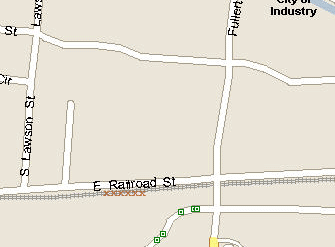
The ordinary way I take to my customer in the City of Industry is at the railroad crossing of Fullerton Road just south of the 60 Freeway. But I took a different route because I didn't want to take the chance of waiting for the train and I wanted to be in early.
This morning at 9:45, I pulled into the parking lot at Fullerton Road and San Jose Avenue and a cop car and mortorcycle zoomed by heading south on Fullerton. I took a mental note and went in. It turned out that I wasn't scheduled to work, and so I sold some Girl Scout Cookies and headed home. Just as I exited the building at 10:20 I notice that it was heavily overcast and a helo was hovering just above. Something was up.
I moved over to my car and started taking pictures. I could see that they were redirecting southbound traffic on Fullerton left and right to San Jose. So as I left the parking lot, I headed East towards Nogales and started recording notes on my Treo. I turned south on Nogales and saw that the railroad crossing was clear so I flipped around right down Railroad Ave to head west towards Fullerton. Already some security person was waving traffic off Railroad back north into the industrial park. So I ended up back on San Jose heading back to where I came from.
As I crossed Fullerton road, the crossing there was clear as well, but it was taped off and there were several fire engines and police cars at the site. The radio news said derailment and it became clear that it was between Azusa and Fullerton. I took my first left onto Lawson to head back south towards the tracks and broke out the video recorder.
It was at the corner of Railroad and Lawson that I could clearly see, down to the East, a big pile of boxcars. They were at least three high. In the few seconds I had, I could see one guy with a video camera on the corner. The Sheriff's deputy was on the loudspeaker telling folks to clear the area - evidently there was somebody East of Lawson heading to gawk. But I never saw any Hazmat personnel nor could I see a fire or smell anything in the air. I headed away and got back into regular traffic.
You can download my 1MB video file here. There's one brief look down the track at the wreck.
UPDATE: NBC reports.
Here's a satellite view from my handy-dandy Keyhole subscription. Click on it to get a bigger picture. 
March 07, 2005
Rats
Whether it's the Technorati story or the Google story or the overblown threat of FEC action, there have been several threads that is apparently knocking a few bloggers back on their heels. I've got a bit of advice. Go private.
Black Contract With America: Call for Participation
Conservative Brotherhood mate Scott Wickham has begun a collaborative Wiki for the Black Contract with America. It's at BlackContract.com and has just begun. I think this has a great deal of potential. On the heels of the Black Bloggers Association, there's a mini wave of collab going on at the nodes of color.
Get on board little children, there's room (and need) for many a more.
Damned Diaspora
There's too damned many black people.
How the hell are we supposed to control them if they show up everywhere at once? I mean take this jig Byron Crawford aka BC. I can't tell yet, but I think he's also Bol Guevara, MD. which is a pretty cool pseud. Clearly, he has tapped into a following - stright underground street stuff. Hiphop music reviews and shit. Anyway, I don't smoke hiphop any more so one can only take hiphop reviews so seriously. On the other hand, anybody who hates Kanye West with such delectable passion can't be all bad.
The 20 Percent Solution
Andrew Hacker wrote in his book Money that given the opportunity, people believe that all their desires would be fulfilled with only an average of a 20% increase in income. I've always thought that was a surprising finding, but I think it's quite true.
This morning I have a bit of silly empirical proof. As a time-waster since I have nothing to do but sit around the house and wait for a job to come knocking on my door, I ventured over to HumanForSale.com and entered the real facts about me. According to this first survey:I am worth $2,390,882.00 on HumanForSale.com
Then I changed my SAT Score, height and a few things about me that I wished were true and got the following score: I am worth $2,615,454.00 on HumanForSale.com
I believe that this means that I am living up to my class expectations of myself. I did check the difference between black and white. It was zero.
The Mile High Club (Not)
Sex at Boeing: Outlawed
The Boeing Company said today that its president and chief executive officer, Harry C. Stonecipher, had resigned at the request of the board of directors because a personal relationship he had with a female executive in the company violated its code of conduct.Mr. Stonecipher is the second chief executive to resign from the company on matters related to conduct since he succeeded Philip M. Condit, who stepped down in December 2003, in the wake of a scandal involving a fuel-tanker contract with the Pentagon.
A Boeing press statement said that the company's board asked Mr. Stonecipher on March 6 to resign after it concluded from an investigation that his relationship with the woman, who did not report directly to him, was "inconsistent" with the company's rules on behavior for its employees. It did not name her.
"The Board concluded that the facts reflected poorly on Harry's judgment and would impair his ability to lead the company," said the chairman of the board, Lew Platt, in the statement that was posted on the company's Web site.
"The resignation was in no way related to the company's operational performance or financial condition, both of which remain strong. However, the CEO must set the standard for unimpeachable professional and personal behavior, and the Board determined that this was the right and necessary decision under the circumstances," he said.
The Puritan Ethic is alive and well in America. Long live Chastity! Sheesh.
UPDATE:
We at Cobb really believe that this is a front and a scam and that deeper problems exist. It's not as high on the smellometer as the Skilling retirement, but it's up there.
Get Scrobbled
Oh yeah baby. I'm gettin' my 'scrobble on.
OK it's true. I slept on this one even while knowing better, but now I have seen the light. Audioscrobbler is the coolest thing on the internet since Orkut. I predict that it will get eaten by Google in due time, which brings up interesting questions about Google's appetites and the amount of goodwill it has yet to squander.
If you haven't heard, Audioscrobbler is the Soundscan of P2P. Just drop a plugin to your music player and it sends the ID3 data from your music files to a collection service. Under your 'scrobbler account will reside a plethora of realtime stats indicating your musical predilections, assuming they are reflected in your actual listening habits. There are, presumeably, some privacy protections in aggregations and the gamut of Orkutrificated affiliative goodies which makes for some interesting rotisserie possibilities.
They've opened up the middleware and data via Creative Commons, a brilliant move that may yet deter omnivorous corporate-types, (and delay the gawdawful task of data cleansing) inviting data warehousing hacks like myself to have a field day. So there are multiple ways to have fun in this playground.
If you get 'scrobbled, look me up and friend up. Cobb of course.
March 06, 2005
Finding Neverland
I don't know what it is about movies these days. Are all critics interested in doing is finding tearjerking melodramas? Gawd, are there any serious films left for adults? I'll tell you, the last one I saw was 'Sexy Beast'.
I seem to be losing my ability to jump meta in dramatic films. The reason for this is that I respect my $8.50 too much. If it's on the Tivo, that's another story, I'm a regular Crowbot. But on the big screen, I shut down my inner critic and let the waves overflow. So I had no idea that the main actor in this deally was Johnny Depp. Hell I didn't even recognize The Rock in 'Be Cool'. Whatever. I'm too busy being entertained, or sobbing my eyes out, one.
This weeper is supposed to be about - oh hell you know what it's about. It's about the story behind the story of 'Peter Pan', a slow motion dissolution of a marriage and the whimsical adoption of a greatly imaginative writer and a family of four boys, their beautiful but ailing and widowed mother and their meddling hairshirt of a grandmother. It's a very charming affair, but I couldn't help thinking that it's a mix between Howard's End and Chitty Chitty Bang Bang. And man I've got to say, there's nothing quite like those thick tweedy period suits. I gotta get one before I die.
'Finding Neverland' is a completely arresting story. Depp's character is instantly likeable, as he negotiates the line between stiflingly unselfconscious London propriety and the delights of the imagination. He's admirably restrained in this role and that's probably why I didn't recognize him. I can only thank the Fates of Hollywood that Jude Law wasn't cast.
So what have we got? Brilliant acting, a touching and heart-rending story full of rosy cheeks, toity intrigue, allegorical richness of a depth rarely approached in Hollywood, and a tie in to the latest Trial of the Century, en passant. What we've got is bucketloads of honest, puritan tears, the likes of which you probably ain't shed since the last time you thought Tinkerbell was going to kick the bucket.
I had been told that as a writer, I would relate to it - that it would touch me because I go off someplace most people don't understand when I'm on a writing jag. I don't know about all that. In the end it just left me feeling a little silly. OK now say it all together: 'Peter Pan' is actually profound.
84%
Antisubordination
Balkin notes:
Speaking of liberals, at least Justices Ginsburg, Breyer and Souter have a principle that distinguishes this case from Grutter. It is the antisubordination principle-- racial classifications are suspect because they help perpetuate the subordination of racial groups. Where the majority acts to undo the effects of past subordination, courts can apply somewhat less scrutiny (although not minimal scrutiny) because what the state is doing is not inconsistent with the goal of antisubordination. That explains the Court's deferential attitude toward admissions committees in Grutter. However, when the state uses racial classifications for mere administrative convenience, as in this case, its goals are orthogonal to alleviating social subordination, and the usual rule of strict scrutiny should apply. Obviously, one could object to this line of argument at several places, but on the whole it seems somewhat more principled than what the other Justices are doing.
This is the case of the black prisoner who felt that he was being discriminated against because he was segregated by race during his first 60 days in prison. Apparently, this practice was initiated by the California prison system because, it had determined that a history of racial antagonism might subject the prisoners to abuse. So it presumed due to this history that the class of Americans who end up in prison are more likely to be racially antagonistic and start fights if they were bunked with mates of a different racial background. So until prisoners could be individuated, they would be racially segregated.
Anecdotally, there are white supremacist and all other sorts of ethnic gangs in prison. So the chance that you might be bunked with a member of a racial gang sounds like a very real possibility. Johnson objected to the separation by race and against the prejudice applied to him. To my ears it sounded like complaining about the color of your fatigues in a war zone, but since our courts obviously have plenty of time for such matters, there would sooner or later have to be a decision.
The case went to the US Supreme Court which decided in the favor of California. Balkin traces the reasoning. Thomas and Scalia say that a prison's gotta do what a prison's gotta do. Ginsberg, Breyer and Souter say the prison isn't segregating for the purpose of subordination so a strict scrutiny isn't required. I agree with both angles. What surprises me is that Balkin, giving the nod to the principle of antisubordination, would compare this case to Grutter, the Michigan Affirmative Action decision case.
He seems to be suggesting that there might be a singular principle regarding race against which all sorts of segregation matters might be judged whether they involve convicts or college students. I'm not sure there is or that there should be with regards to the law. I don't have a legal theory for this, but it makes me uncomfortable in a way I can't quite describe.
I think the reason for this might actually be dangerously biased, and yet I still believe it to be right. The simple answer to the stupid question of 'What do black people want?' is 'Anything worth having.' But the full answer goes a little bit more like this from the SCAA FAQ (of which I used to be the keeper):
Black people want everything worth having, and the other things too. We want to have it as black people, but only when we say so. We will do anything it takes to get it, and anything else we feel like doing whether or not that's useful. You can't figure out our reasons unless we tell you, and if we don't feel like telling you, so what? And if you guess, so what?
Black people want to be invisible, except when we don't.
Black people want to be called African Americans, so forget everything you've heard about 'black people'.
African Americans want to be black, except on those occasions we feel like that's not necessary.
Black people want to be treated, most of the time, as follows. All of the above is subject to change without notice, some restrictions apply, participating blacks only, your mileage may vary, see individual blacks for details and specifics, void where prohibited, you must be 18 or older to play.
In other words, it's a very squishy human thing, but you can generally expect to get the gist of it if you pay enough attention. Legally, the above makes no sense whatsoever, but it makes perfect sense when you think about it and talk to enough blackfolks about it.
For what it's worth, no matter how we individuate ourselves as Americans, we are always tied to American history. And it seems to me that there has not yet transpired any period of time long enough for what the African American experience symbolizes other than antisubordination. For at least 3 more generations, blackfolks are going to be bogarding. We will be grasping on to our claim on this place and all the respect we can muster. For a long time, our individual meaning will be subordinated to this historical theme. Even the universal disclaimer shouts it.
Apparently, even the black convict is chasing after equality with white convicts, and his case goes to the Supreme Court. Damn!
Driven to Security
Apart from the fact that I am doing it between 9pm and 2am, my quest to master elements of electronic security are very good for me.
When I took my first full-time job in 1979, it was at the radio department at Fedco La Cienega. As much as it's possible to be something of a local celeb, it was a very cool job to have back in those days. Hmm. I do need to do some more writing about those days. At any rate, I spent a lot of time at the high end audio concession and had a serious case of audiophilia, traces of which infect me to this day. What astounded me was that I discovered that there were turntables which didn't wear out records or skip. In my entire life up until that point, I took it as the nature of the beast that eventually all vinyl records skip and that you need to tape coins onto the tonearm so they wouldn't. Then I started learning about the subtlties of tracking force, anti-skate and the rest of turntable physics and I began to understand a new dimension. I soon purchased a Dual 440 and showed off the fact that I could play records upside down. Freaked people out, and underscored my lust for the technology. These days I am lusting after the unattainable beauty of perfect security. I'm actually starting to have dreams about it.
I've gotten my GnuPG working through Enigmail and a crufty little tray app called WinPT, but I'm digging the CLI. I've also been coming up with a series of code schemes to assist me. As I continue on this quest, several aspects of security are becoming clearer to me - to the point at which the hitherto impenetrable language is actually starting to make sense. But that means bigger questions.
Fzample, a PRNG is a pseudo-random number generator. This is something that a computer does because a computer is not a random machine. Certain algorithms do what they can to be as random as possible to generate a stream... The idea is that a computer can approach the perfect security of a one-time pad, but can't match it because the very fact that computers can be emulated make them incapable of perfect randomness. The idea of a one-time pad is that if you have a message that is x characters long and you mate it with a totally random key that is the same length and never use that key again, you basically have perfect security, because there is never a clue or a reason for that key to be determined. So the point is to come up with as random a key as possible.
How? Well that's the science. There are lots of ways to try to come up with random sequences of numbers but you have to start somewhere. That's called a seed. It's more difficult than it sounds. Take for example the first idea that I came up with:
Get yourself a baseball bat and a digital camera. Go out into the yard and make like one of those idiots on America's Funniest Videos. Put your head down on the upright bat and spin around until you are sick dizzy. As you are about to fall, wip out your digital camera and take a picture. Now come to your senses, download the digital picture and point to a random part on the screen. Find the color of the pixel you pointed to and use the digital code of that that as your seed.
Now how could I attack this method and come up with ways to guess the seed? I could look at green grass and blue sky and figure out the percentages of the time those numbers come up. I could guess that most people are right-handed when they point that their pixels could tend toward the right. I know most people won't try this at night and that they are not so likely to point at pitch black and a few degrees away from that, or perfect white and a few degrees from that. So what might seem to be random is actually not because of limitations of human perception. What we think might be a good random number simply isn't because of the ways humans think. Magicians do this kind of stuff when they're guessing your card.
One of the ironic principles of security is that 'security through obscurity' is a fallacy. Simply because a human being is highly unlikely to think of something does not make that something more secure. This is the challenge that I face in coming up with my coding schemes, and I'm trying to work my way through it. I am coming up with several coding schemes of varying strengths. The first one is called 'X' which is all of the memorized passwords I have used in my life, which could be reduced to a set of about 30. That includes bank PINs and simple passwords I use for website accounts and other kinds of stuff like that. (I've also been using PWS for several years and several other methods, so I'm not so vulnerable.) But of course I forget some of these passwords. Then there is 'Q' in which I take the chapter titles from certain a certain book and run an MD5 hash on it. The result gives me a nice 32 character passphrase which I use in a blowfish cypher. The cool thing about this method is that I can name the encrypted file with a Q10 and know that to generate the passphrase, I just need MD5 and a copy of the book (and a blowfish decoder of course). But what I don't need to do is remember the actual password for the file. What I do have to remember is the 'Q' coding scheme.
The question I have is whether coming up with coding schemes that help me systematically generate strong passwords is actually useful. In other words, does naming a file with some clue to its decryption key make that file more secure because the passkeys are immediately unknown to me, or should I use one master passkey and encrypt all files with that passkey?
I understand that the encrypted file is only as safe as the encryption method. The essential question is whether using multiple passkeys (not to encrypt the same file, for heavens sake) makes a single cipher better, and if so what is a good repeatable scheme?
I know that if I use codewords in the plaintext, that makes message that much more safe in case the cipher is successfully attacked, but my problem is password management. I don't like the idea of having all of my passwords to everything in one file under a master password. I'd like some files to live independently of my having a stored password.
Being Cool
Friday was a good day. I am exiting the funky mood that has stressed me out for the past fortnight over the collapse of the China Deal. In fact, I've got my own joke about it, which is that I'm completely over it, just don't mention the number 2.8.
Since I am becoming immune to the heartache of debacles, I had the foresight to think of a Plan B, C and D. Yesterday afternoon I recieved word that all of those plans are looking good. So I decided to treat myself.
My new hangout is The Grove, the insipidly happy upscale shopping village on the eastern edge of Farmers' Market in West LA. I can't tell you what a jolt I get just eyeballing the international shopping set - the people who have afternoons off during the week to shop and look downscale fabulous. I came to understand 'downscale fabulous' back in 98 in Silicon Valley.
I was wasting an afternoon buying a new pair of slacks and Ecco shoes at the Nordstrom in Palo Alto. As I was right there in the mecca of VC money, something Mill Road, I happened to wander into a Banana Republic. I was utterly perplexed at why anybody with that kind of bling would spend money on clothes that were totally uninspiring. Banana Republic is the anti-style, it just screams mediocrity. Something about this completely boring and non-functional $200 sweater just smacked me. Then I realized that Banana Republic clothes are those that rich people wear when they don't want to look rich, but still look rich. It is the Switzerland of fashion - neutral. Uptight with goo-gobs of money, but utterly, purposefully neutral. On the other hand, if your hair, skin or teeth are in miraculous condition, wearing Banana Republic is a very sly way to show off. I get it now.
Since the China Deal had to do with catering to this very crowd, the upscale who are still not so rich that they hang out in public, I have been having a great deal of fun thinking up market strategies that would attract them to our attraction. My job would have been wiring that place, which means I have been channelling Gizmodo and thinking a lot about what the iPod of Beijing might be. So I've especially been scoping out the fashions of swanky Asian youth and checking out what kinds of cellphones they sport. More than a few have the very same green and silver Motorola bluetooth earpiece as I, so I knew I wasn't far from the right track.
Alas, there is no China Deal, but I can still enjoy the Apple Store. Plenty, I'd wager, has been said. I second it. Apple has done it perfectly. Their store is overstocked with young, helpful, hip people dressed in black. If you've ever stayed at the W Hotel in San Francisco, then you know how seductive it is to be serviced by young, helpful hip people dressed in black. Give them headphones with boom mic, and it's practically erotic. Greater still is the Genius Bar, with Men Over 30 (tm) who actually answer complicated questions. At least they appear to, my question about why Darwin is a piece of shit couldn't be answered before my 4:45 appointment time, and I had a date with a 4:15 show.
But my entire excellent move began at the other end of Farmers' Market at LA Korea. This is, by far, the best Korean BBQ I've ever had. It's so good that it makes me think in cliches. I could eath that stuff forever. What kills me is that I have no idea which piece of beef that is. I simply don't understand the cut which is Kalbi, I just love what it does to me and my breath. And yes I have long developed my tastes for Kimchi. Theirs is simple, pretty mild and very fresh. By the time I got into the new massive Grove theaterplex, I was prepared to laugh at anything. Which is a good thing considering the calculated ripoff that is the new Travolta flick 'Be Cool'.
It is perhaps with some irony that I remain positive about the Hollywood Suit. For it was in the Hollywood Suit that I met the cat who promised me the China Deal. And even though there is a slimy amount of self-referential Hollywood smirk in 'Be Cool', Travolta's Chili Palmer still looks good in the Hollywood Suit. So there's something timeless about it, but this film is pretty much forgetable. On the other hand it can be a boatload of fun if you have a little more to drink than I did.
Everybody who wasn't in Ocean's Twelve was in Be Cool, but they were all saying the same kinds of lines. You know, the kind of deadpan double entendres that are at once kinda cool and kinda kitschy at the same time. Hold it, wait. Black hiphop-speak is the new Yiddish. I should not say 'kitschy' but 'wack'. Yeah, this was the movie with the straight wack dialog, which is most certainly the argot of the music business. I must say the wigger in this flick out wiggers Rappaport from Bamboozled, no mean feat. And Cedrick the Entertainer of all people, gets to deliver what is probably the first runner up to the best monologue before busting a cap right behind Christopher Walken's trailer scene from 'True Romance'. Yeah I know I said that last week about the Devil in Constantine, but this time I really mean it. It's going to go down in history if there's any justice in this world.
But the rest of the film was forgettable. Well maybe not. Either way it was embarassing fun, and I'm glad I saw it. Then again I liked 'Swordfish'. Bottom line, I'm cool. I have stared the loss of great fortune down. I swear I am so glad I have family.
March 05, 2005
A Tribute To My Wife
I generally talk about the Spousal Unit in passing, but I want you to know that she is saving my life right now.
In a highly dramatic and surprising turn of events, it seems that it is unlikely that I will be going to China after all. All I'm going to say about that is that I lost the equivalent of about.. Hmm. I'm still not ready to talk about it. But let me put it this way, I was rappin' like Special Ed two weeks ago. Now like Chuck D, I'm living low, next to the bass. (Turn up the radio). And very much like the losing finalists in The Amazing Race, it had to do with the fact that I wasn't driving the taxi and one of the members on my team went ballistic.
It is difficult for someone as brilliant as I to give up millions of dollars, and that's what this was all about, and go back to the previous mindstate. So I have been pitching an internal bitch for a fortnight.
The other day, however, in the wake of an interview I had early Friday morning in Sacramento (hell yes I have a backup plan), the wife and I sat down to lunch at our favorite mexican restaurant, Rosa's on PCH in Hermosa Beach. We met about 17 years ago in that small town on the West Coast and used to eat their excellent machaca on the regular. So every time we go back, we are kind of plunged into that pleasant nostalgia, and now that we've been married over a decade and are not so entirely resentful of the fat and wrinkles on our faces, the smiles are wholly genuine.
On this particular day we took a break from talking about the present and talked about the past. We realized something different about the context of my proposal to her. She realized that I was indeed a great deal more spontaneous about it than she thought. I realized that she didn't know. It happened sometime in the spring of 94 at a restaurant in Cambridge. I invited her out to Boston with not a whole lot of particulars in mind. She had basically given me an ultimatum - are we going to be just friends or what? So in what started out to be an attempt at rekindling an old flame to see where it might lead, ended up as an engagement for real. I was so taken by the moment, that, in front of the gathered crowd at the Border Grill, I proposed twice. I asked her to marry me and she said yes. I said something to the effect that it can't be that easy, and I really want you to know this is what I want, so I asked again. She said yes again.
Cynthia grew up in the Midwest in the Baptist tradition. I wouldn't have guessed that I'd marry such a character in a million years. But what I found out the hard way is that such a practical individual would be exactly what I needed. So we discussed coulda woulda shoulda and speculated what kind of loser I would be, had I continued in my search for a trophy wife. After all, that was one of the attractions to Boston - a veritable treasure trove of grad coeds. I was not above trolling old Harvard Yearbooks and crashing alumni functions, but that was a different me. What? Did you think I just hung out at bars and clubs? You think I hung out in Edgartown for the seafood? Quite frankly I had had it up to here with American women, but fortunately that one of Schroedinger's cats is quite certainly dead.
So I married the right girl. The girl next door, from Detroit. Never once has she ever appeared frivolous, thoughtless, careless. In many ways she is and always has been my rock. I could never think about living with anyone other than she, and I never tried. And it is in the living together that we have forged something which is extraordinary to both of us, not incidently because our lives are so very different than when we met.
At this particular point, she's a great sounding board. I may be fairly articulate when I begin to write, but there's a lot I don't say in person. Yet I expect people to know what I mean. Listening to me can be an exercise in either frustration or futility, because I'm not one of those who likes to explain himself. I've been told that my impatience with people can be rather transparent. So griping with her offline before dealing with business has spared me many an embarrassing conversation confrontation. It's a particularly useful thing when I'm in between gigs.
This time around, I'm going to do the full-time thing. I've been independent for almost four years since the dot com days, and it has been feast or famine. So the next [four?] years are for her. Some nice predictable hours and cashflow. I've swallowed hard and recognized that business opportunities of all sorts abound for those with the right networks, and this will be just another way to build another network - something I have gotten a lot better at over the past few years.
Like many American women, C struggles with the choice between career and family. I'm something of a traditionalist, so when I'm not making enough money for my wife to stay home, even in these days of dual incomes barely making ends, I feel off my game. So while it makes me feel great when I bring my game, I also know the material difference it makes with the quality of our children's lives. In this, she has excelled in ways I couldn't imagine in all the years I've known her.
In this house there are arts & crafts supplies of almost infinite varieties. Under my wife's instruction, my kids have built an extraordinary bunch of things from popsicle stick picture frames to brazilian pastries. She is the absolute master of home entertainment, our barbecues, holiday festivities and birthday parties.
...
At this point I feel self-conscious and silly. Of course I love her, of course she's great. All the love songs are about her, all the warm prickly feelings I get when I see the house and pull into the driveway are about her.
Here's to you babe.
March 04, 2005
Municipal WiFi
If I had a 'politician of the month' award, it would go to Michael Copps who said the following:
"I think we do a grave injustice in trying to hobble municipalities. That's an entrepreneurial approach, that's an innovative approach. Why don't we encourage that instead of having bills introduced--'Oh, you can't do this because it's interfering with somebody's idea of the functioning of the marketplace...a municipality is a democratically run institution. They can make their own decisions. They don't need the Bells. They don't need the Administration, and they don't need me telling them what kind of decision they should be making.'"
Me like.
If I Ruled The World
Somebody asked me what I'd do if I could reshape the US. I have a bunch of clunky answers.
I think the first thing I would do is something akin to the Napoleonic Code, which is look at law from the bottom up and simplify it all. In the same way that republicans are seeking to flatten the tax code, I would simplify the legal code.
I would open the borders completely, and would go about finding a way to compete in global manufacturing. I would legalize marijuana just to get liberals on my side, and I would tax the hell out of it.
I would replace the History curriculum in public schools and replace it with Constituional studies. I would have high school graduates knowing pretty much everything they need to handle small claims torts.
I would abolish standardized testing, and have English composition requirements for all legal immigrants. I would certify public schools the same way we certify restaurants in California, have a great big letter grade on the front window.
I would establish an extraordinary set of open pricing requirements for all businesses over a certain size, a la Walmart. I would basically take SarbOx to the next level with regard to openness. I would make looking up P&L and Balance Sheet data on every publically traded company as easy as looking up their stock price.
I would push forward to close all Indian reservations and basically change those arrangements for a kind of internal third world zoning.
I would make Imperialism real. Nation building means American expatriates get free land in target nations with the first choice going to military families.
I would crack down on the pharmaceutical industry and set fixed finacial limites on torts for medical malpractice to something like 3x the cost of the procedure. At the same time I would reclassify a large set of elective and experimental procedures as 'play at your own risk'. I would legalize euthanasia and fund hospices.
I would establish a President's Council on Religion and hold regular confabs. I would establish a national monument somewhere in the open West and initiate an American Pilgramage in the spirit of The Long Now.
I would split the Pentagon into the Defense Department and the War Department. I would establish a new International forum to replace the UN under the military auspices of the current permanent Security Council and I would launch a set of joint operations agains narco-nations.
I would launch a huge set of initiatives aimed at bringing Mexicans, Canadians and Americans together.
I would deregulate broadcast media, and tax them to fund a largely expanded C-Span. I would open up several new broadcast frequencies for public use.
I would drill for oil in Alaska, and I would marketize pollution credits in line with my SuperSarbOx.
I would drastically reduce income tax and drastically increase consumption tax and drastically reduce capital gains taxes.
I would push for national housing standards for construction regulations and zoning which make sprawl more difficult, integrates low income housing, and make.
I would make a minimum land area of 100 square miles for any federally 'protected lands'. I would create large incentives for new construction in economically depressed areas if they fit the new standards for the Internal Third & Second Worlds.
--
My aim would be to simplify American life and increase individual capacity. I would make living in America cheaper. I would encourage immigration and all manner of things that bring us closer to the rest of the world and the rest of the world closer to us. I would create in the US the most sound infrastructure possible and make us all experts at understanding and replicating it.
March 03, 2005
Black Bloggers Association
Ric Landers has got it going on.
His Black Bloggers Association website has only been around a couple months, and I find that I'm using it more and more. I use Yahoo RSS feeds to keep up with all the blogs and syndicated stuff I like to check first, but on the black hand side, Blacklogs is number one.
The Problem with the Christian Right
As I've said before, the Christian Right is full of itself and thinks it is a lot more influential than it really is. Simply because it is capable of getting in a catfight with leftist Hollywood scum, the battle gets lots of press and airtime. Meanwhile the rest of us are either alarmed or non-plussed. In the middle of that is somebody like me who believes that the religious have a point and that the Republican Party needs to be careful and clever.
Evangelistic Christianity is a caustic influence in contemporary political activism. The ability of men like Carl Rove to drop the right rhetoric into campaigns, something whose origins are in the reverse psychology of Richard Viguery does not make a campaign righteous. I think the Christian Right is going to be very disappointed when the Christian Left gets rolling and they discover themselves agitating on secular platforms in the upcoming elections. Sooner or later Howard Dean is going to find a Jimmy Carter with brass balls, and that's going to be the end of it. Still in all, its a distraction from the real issues that our government must deal with. Think about it. The country is already 90% Christian, any so-called 'Christian' activism in politics is stupidly redundant or actually very narrow. It's the latter.
So it's a very important to understand not only what the consensus of the Christian Right is, but what particular constituencies within it want, and who exactly they are. I think a lot of me-too-ism is getting exposure based upon the momentum of the Bush win, but when all the confetti has hit the floor, people are going to have to stand on their own.
I know there are a lot of conscientious Christians out there who are identifying as Christians first because of this sound and fury, but who are not Fundamentalists and do believe in the separation between Church and State. But this is a detail which is not often talked about in the simplistic Red vs Blue.
I actually don't want to beat this horse to death again, my essential point is this: The real problem has to do with the legitimation of religious evangelism as a form of political activism. It's a line that shouldn't be crossed in a Western democracy.
And I think anyone who actually goes to church knows that simply having laws written in books is not what keeps people on the straight and narrow, but loving fellowship in a community that is rooted in those laws. You can't just pitch the Bible at sinners across the street and expect that the good in it is going to sink into their heads with a thud. You have to invite them to fellowship and discover what they want and need in their lives. All this moral posturing and bombast doesn't work with Americans. Did you forget who we are? We're Americans! Nobody bosses us around, especially not you.
The problem with the Christian Right is that 'Christian Right' is not a Christian term, but a demographic term employed by political consultants (and bloggers). It's a large amorphous collection of suckers to be seduced by expert con artists like Karl Rove, and rah-rah'd in the Blogosphere. But as soon as Christians start seeing themselves as the 'Christian Right', which master do you think they're serving? Go to you church and ask your pastor, is this the church of the Christian Right? I don't think the answer will be yes.
So I think we have a very basic ethical dilemma here. It has to do with the question of how Christians, whether conservative or not, engage the public. And I think we need to get to the bottom of the current revisionist history which suggests this is a righteous Christian Nation that needs to get back to its Christian roots as if 'Under God' were in the National Anthem. There's a very important reason that our flag doesn't have faces or words on it and I'd hate to have the legitimate beefs of Christians discredited because their tactics would have us burning crosses into everyone's minds.
You see I cannot get over the fact that for 200 years, all the Christians in this country were unable to do what Abraham Lincoln did with the stroke of a pen, and all the Christians in the South found that it took 100 years and Federal Troops to force them to obey the New Covenant. So while I am certainly convinced of the reality of Christian morals, being a son of Ham, I am not particularly impressed with the effectiveness of Christian politics on the law of the land.
March 02, 2005
The Ethics of Death, Strength and Weakness
Life is real! life is earnest!
And the grave is not its goal;
Dust thou art, to dust returnest,
Was not spoken of the soul.
-- Longfellow
I've been thinking about how often recently I've come to bump heads with LaShawn Barber, our populist conservative, and out of all things we collide on the one that has aggravated me the most has to do with her 'pro-life' stance on the matter of Terri Schindler-Schiavo. You see, I've been a big fan of Kervorkian for a long time.
I'd imagine that my sentiment first got the better of me when I went caroling at the old folks home in the 7th grade. It was my first experience with the gawdawful pathos of abandoned, weak and dying human beings. This was no shady acres. This was smelly joint right next to a hospital which has had at least three different owners. In the not so nice part of the 'hood. Specifically, on Western north of Adams Boulevard, one block from the freeway. The one image that remains with me to this day is that of a man of about 80 some years with no teeth whatsoever, soiled, drooling with his mouth agape sitting in a wheelchair in the hall. He was little more than a skeleton and his mouth seemed so large that we were all in danger of falling in. Like a dementor from Harry Potter's world, you could not look at him without feeling the suffering of the entire planet on your shoulders.
We were told in no uncertain terms that for many of the people there, we were the only visitors they ever got. They loved to touch us, these oldfolks. They smelled our hair and hugged us. It was clear to me that we were, for some, their only joy, indeed their only reason to hang onto life. Forgotten by families, abandoned by all but the periodic nurse, they waited to die.
Growing up in Catholic school, we were made very aware of the ethics of euthanasia. I was for it, and still am. And I paid a great deal of attention in those days to the development of hospices, although I had long lost my nerve to volunteer again. But all of these were fairly distant and vauge notions merely abetted by quotes like Einstein's, that it is a wonderful thing that at the end of one's life it can be appreciated as a work of art.
Then I read Robert Nozick's 'The Examined Life' and his chapter on Death, the very first chapter in the book, struck me with its clarity. In such a short space, it became apparent to me that nobody talks about death but the grieving and the violent. We often think of the President as one who gravely thinks about the consequences of his orders. Perhaps we think about firefighters, soldiers, cops and doctors as people who might think about death, but what about us? How do thoughtful people die, and what is the state of the average American's approach to death? I was left at the time with a big question mark, an empty space within which I could write my own ideas from scratch.
Nozick:
I amd not sure, however, whether we should be so attached to existing. Why do we want to be told that we continue in time, that death is somehow unreal, a pause rather than an ending? Do we really want to continue always to exist? Do we want to travel with our rickety identity forever? Do we want to continue in some sense as an "I," a (changed) center of consciousness, or to be merged into a wider already existing one in order not to miss any of the show? Yet how greedy are we? Is there no point when we will have had enough?
At some point later, I encountered the Akan. In the cosmology of the Akan, death is non-existence and is accepted simply. The Akan have two prime-movers, the Creator and the Demiurge. The Creator created life and death, being and nothingness, and then he created the Demiurge. Into the ear of the Demiurge he whipered the laws of the Universe and ordered him to create. When the Demiurge turned around there was nothing, and so built the universe. For the Akan it makes no sense to look for life after death, for the Creator created death in divine inspiration, and respected his own creation by dying.
Even as a fairly young person, at the age of 19, having been three years initiated by Confirmation into the Episcopal Church, the notion of eternal life was useless to me. A Christian must take the notion of salvation on faith, it is only by grace that we are saved. Then what of our earthly good works, should we do them only in order to procure Heaven? How is this different from the most vulgar of transactions? Why not make a deal with the Devil instead? Why not make a deal with God? What is the price of the ticket? No, it is the goodness of the acts themselves, and the selflessness through which they are given which are the currency of salvation. We can know this because we possess the vision of God, literally the divine sense of good vs evil without which we might as well be talking about morality as if it were ultraviolet light. We bit the apple, and it is the core (hah) principle that holds us accoutable to God. Without it there is only predestination.
Death become irrelevant except as a period at the end of our sentence on earth. After death we are no longer subjects, but objects. Our will is meaningless after death. We commend our spirits into the hands of God - out of our own hands.
But what are we to make of the death of those around us? In that I am prompted to this discussion also by a comment on the life of Hunter S. Thompson, I should speak specifically about suicide. Catholics see suicide as a mortal sin, one which like murder, invalidates salvation. How then should we consider Nozick who says:
After an ample life, a person who still possesses energy, acuity and decisiveness might choose to seriously risk his life or lay it down for another person or for some noble and decent cause. ...a person might direct his or her mind and energy toward helping others in a more dramatice and risky fashion than yonger, more prudent folk would venture...I have in mind the kinds of of peaceful activities and nonviolent resistance that Gandhi and Martin Luther King engaged in, not a vigilante pursuit of wrongdoers - or in aiding people in violence-ridden areas.
I am struck by the beauty of such a notion. In fact, I think we all are. Soon I will be re-watching the Eastwood classic 'Unforgiven' and I will be thinking of his character as one who not only knows he is beyond redemption but also as one who knows his death is imminent and living in the moment, he must do right by people. It is this heart-wrenching example we have of 'Shane' as well, riding off never to return.
But is it suicide when you run into the burning building to save the puppy? No. The difference between taking your life for the sake of someone else and out of self-pity is the entire moral difference. It is this moral distinction for the Christian, at least, that gives us the primary guideline which allows us the power over life and death. I cannot say at which point such a utilitarian equation begins to break down in the hands of groups or governments. But at the level of the one, it seems fairly clear that the proximate cause of ones personal choice to live or die outweighs the fact of the death itself. One can choose to die righteously for the sake of their neighbors or in the case of suicide, selfishly.
This is the context out of which I pass judgement on Terri Schindler-Schiavo. If she is so alive that she grasps the weight of the burden of her continuing existence, then she is guilty of greed. Is she or is she not a moral actor in this drama? If she is, then she is wrong for dragging her family through this anguish for over a decade. If she is not, other considerations take precedence. Legally, she is not responsible and so the decision falls to her family.
I think of strength and weakness in terms of the ability to accomplish moral tasks in this light. Gandhi was strong despite his physical frailty, he was hugely influential. In our society, people's agency is constrained by our social contract to be bound by law. In some ways, it seems heroism is only possible by outlaws; that is a measure how limited our liberty is. Perhaps this is why the Western film is our best vehicle for moral instruction, the panoptics hadn't yet been constructed, nowhere was on the grid. Consequently, in our contemporary society of laws generated from a mishmash of criss-crossing ethical systems there are fewer ways that the individual decision and action makes a difference. This is a theme that I will begin to harp on as an expression of libertarian activism. What I sense is perhaps well described as 'creeping socialism'.
In our civilization, we are overreaching in matters of social equity. I perceive that this is being done in disrespect of the African. I'll only touch on this for the moment. Put crudely, doing for the black man has been more an act of charity than an act of recognition and respect. And this wellspring of charity has overflown in all directions rather indiscriminantly. It is suggested that we do for fags, cripples and retards what we did for niggers, and I use those perjoratives consciously. I question the motiviation of the actions of mainstreaming. I think we do it because we have the capacity, but not necessarily because we have the will and determination, and certainly not because of a Douglassian concession of power. What we are manipulating is our perception and our sense of tolerance - we are creating an equality that is not truly equitable. We are creating an arena of perceived equality without regard to reality. It is delivering this sense of judgement in the proxy of laws and governments out of the hands of individual self-determination that gets under my skin. We are going from political correctness to legal correctness.
We have created a national building code of ramped sidewalks and blue parking spaces to mobilize the immobile. What we have failed to do is recognize or realize what the immobile might do with their immobility other than pretend and desire to be us. This is what gay marriage does. It disrespects and flattens reality and undermines the truth of difference. It makes us all less able to deal with finite limits. This comes from the same place as the denial of death, because it suggests that all vitality is the same.
So I take to task those who are 'pro-life' because I think they have it wrong and their fudging with the ways and means we make it legal to live and die in this country takes us further away from individual liberty and further into the panopticon. They want us to live in the same subset of life's possibilities. If we are all the same, then we should all be born the same way, then we should all live the same way, and consequently we should all die the same way. I don't think so.
UPDATE: Some others have come around to the discussion
March 01, 2005
Ours to Take Back?
Essence magazine and several others notable have come with the hardline to 'Take Back Our Music'. I find this an admirable exercise of common sense, morality and courage, but mostly common sense.
I've been excoriating hiphop from time to time, remembering what it used to be in the days of the New Jack Swing, when the Beastie Boys were as crazy as the genre got. Some of you can probably remember Kid & Play, and others, before just about every rapper bent forward with a mic in his face and made wild gyrations with the off-mic hand. You know, when rappers used to actually dance dances with difficult steps.
I remember living in Brooklyn when the rumor came out that some racist Afrikaaner was behind the new mysogyny and violence in rap characterized by the rise of groups like Onyx, whom in retrospect hardly did as much damage to the reputation of women as today's decendents of the worst side of Sir Mix-A-Lot. 'Nuff said, the crap has gone downhill to the point at which it is barely tolerated by many who used to live it. Like a neighborhood infested by roaches and crack, it's just not home any more.
It wasn't the Boers who made funded the crookedness of hiphop, but the supply-siders were fundamentally right. It isn't consumption that makes hiphop what it is, it's production. The art of hiphop became a pseudo-science of marketing, but none of that would have happened without money and direction. Arguments about what dysfunctional suburban white boys wanted from hiphop was, is and always will be a cop-out. Suburban white boys don't spend any more on CDs than anyone else - they consume just like everyone. They do just what (good) rapper Rob Base said: "Take it off the rack, if it's wack, put it back." That's called shopping. It takes a fifth grade education to buy something from a store - the convenience built into the system of distribution makes it simple to get whatever is on the rack.
I'm not going to dismiss the demand side of the equation, because I sure as hell don't when it comes to all the things that ghetto residents get into their corner stores from the far corners of the globe, including bananas, orange juice in winter and crack. I do think people should be free to buy straight porno, and that's what I consider most of hiphop to be these days. But broadcast porno? No. No. No.
So when it comes to the question of taking the music back, what we are going to need to hear more of are people like Regina Robertson playing their part. People who make the choices about what to produce for mass consumption have a grave responsibility to the public, and people who produce entertainment products have more than just a passing responsibility to standards of decency. These are the thinking people who plan with the millions. When then sell out their values, the marketplace is poisoned.
So we have to ask, how much of this campaign is actually going to affect those people who sit atop the production dollars? We didn't name 'Murder Inc.', nor did we rename it 'Tha Inc.' That's got to be a top-down move. It's going to take pushing the envelope in a new direction.
The bottom line falls on moguls like P. Diddy and Jay-Z at Viacom. They are The Man. They can make or break an act in the business. They direct the dollars, and the investment dollars flow on their say so. If it wasn't that way, we wouldn't hear rappers constantly timestamping their records with lyrics verbalizing who their producers are.
Back when Latifah only rapped, she and Chuck D did their thing called 'Self-Destruction'. They did that when there was only 1/5 of the black power in hiphop production that there is today. If the music is 'ours' to take back, then P Diddy and Jay-Z are 'ours' and they'll do the taking. Otherwise all we have is common sense.
